Critical Review on Cultural Intelligence in Cross Cultural Management
VerifiedAdded on 2023/01/12
|21
|6764
|33
AI Summary
This critical review explores the concept of cultural intelligence in cross cultural management. It discusses the challenges and implications of managing across cultures and provides summaries of primary researches on the topic. The review highlights the theories and approaches followed by research scholars in writing research papers.
Contribute Materials
Your contribution can guide someone’s learning journey. Share your
documents today.
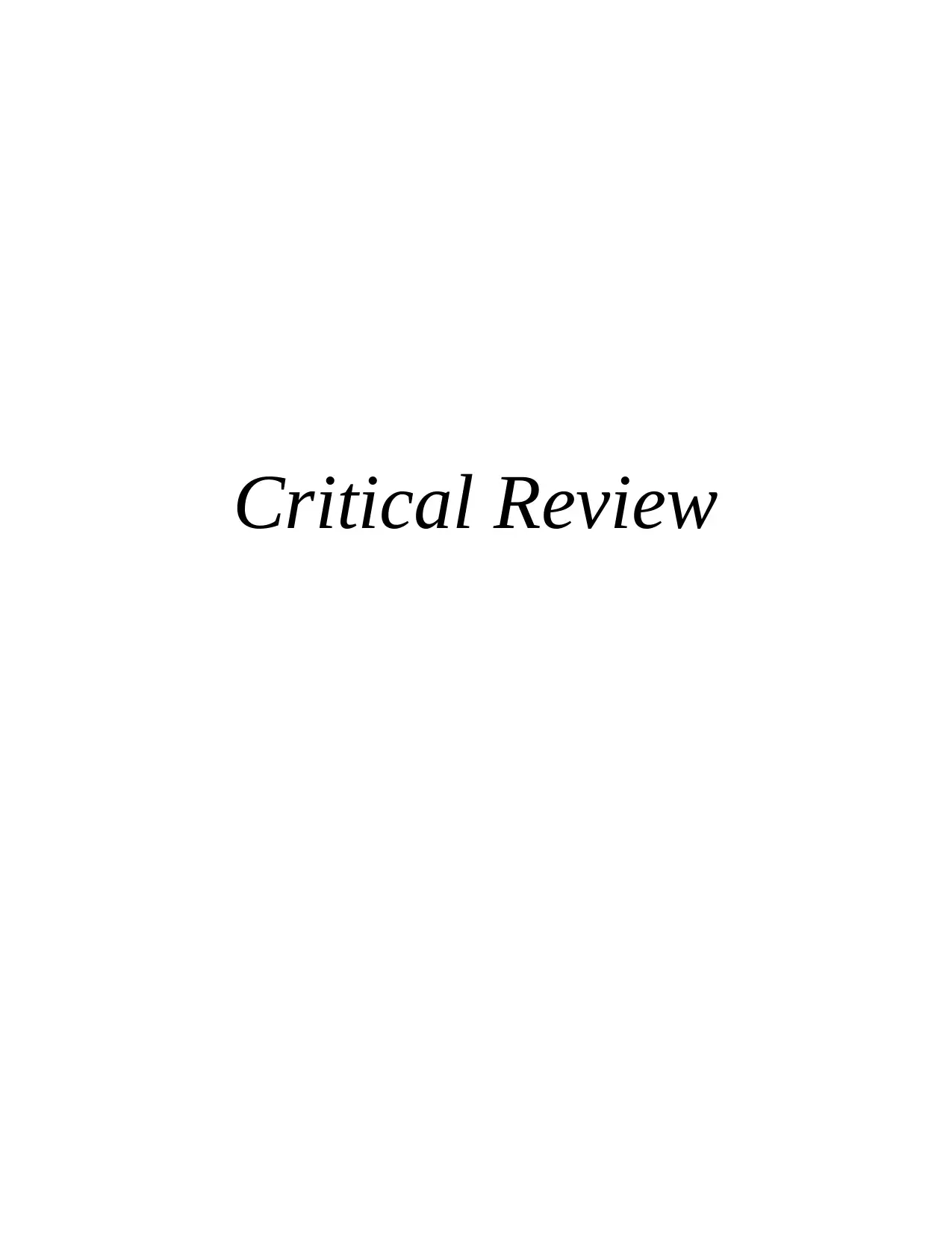
Critical Review
Secure Best Marks with AI Grader
Need help grading? Try our AI Grader for instant feedback on your assignments.
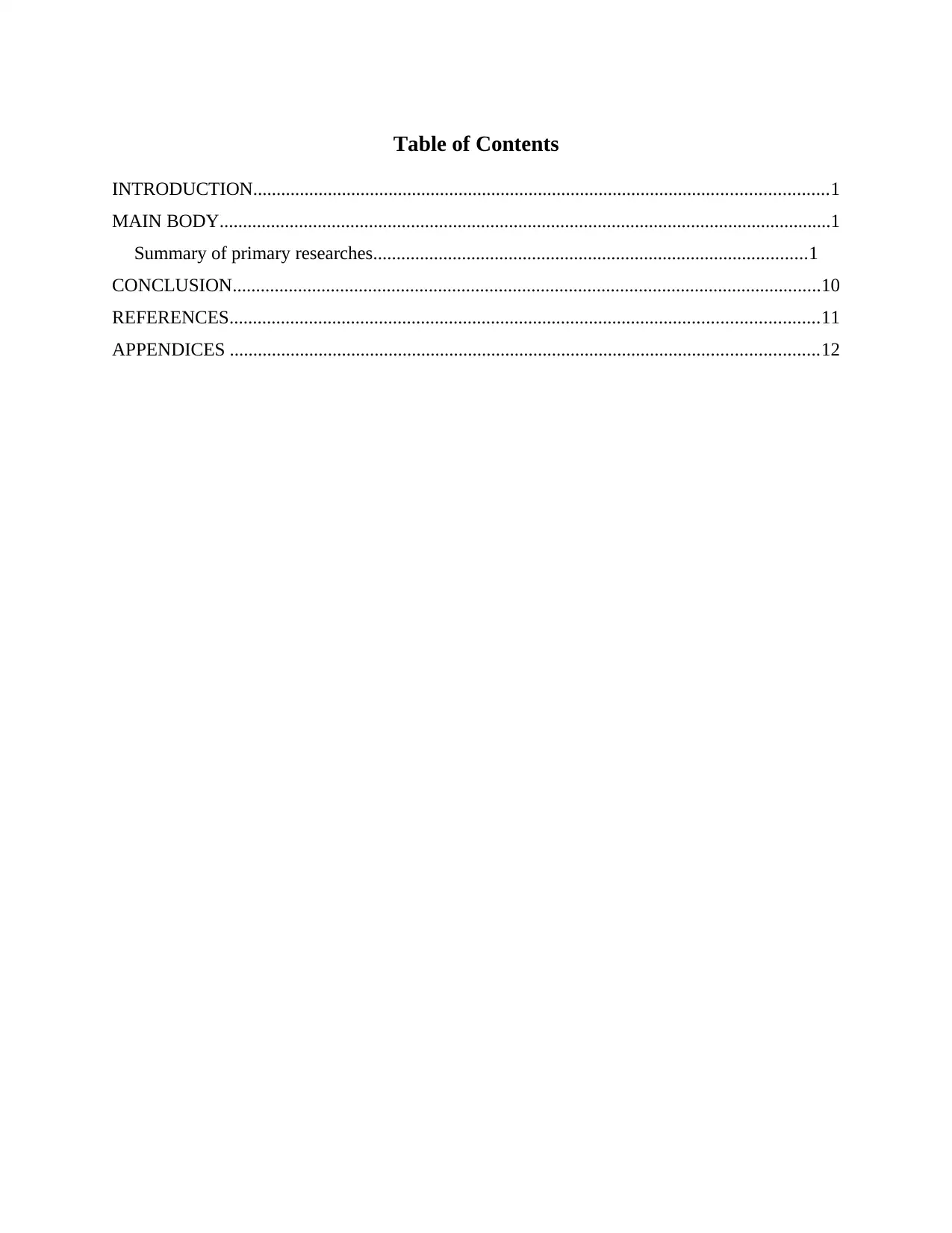
Table of Contents
INTRODUCTION...........................................................................................................................1
MAIN BODY...................................................................................................................................1
Summary of primary researches.............................................................................................1
CONCLUSION..............................................................................................................................10
REFERENCES..............................................................................................................................11
APPENDICES ..............................................................................................................................12
INTRODUCTION...........................................................................................................................1
MAIN BODY...................................................................................................................................1
Summary of primary researches.............................................................................................1
CONCLUSION..............................................................................................................................10
REFERENCES..............................................................................................................................11
APPENDICES ..............................................................................................................................12
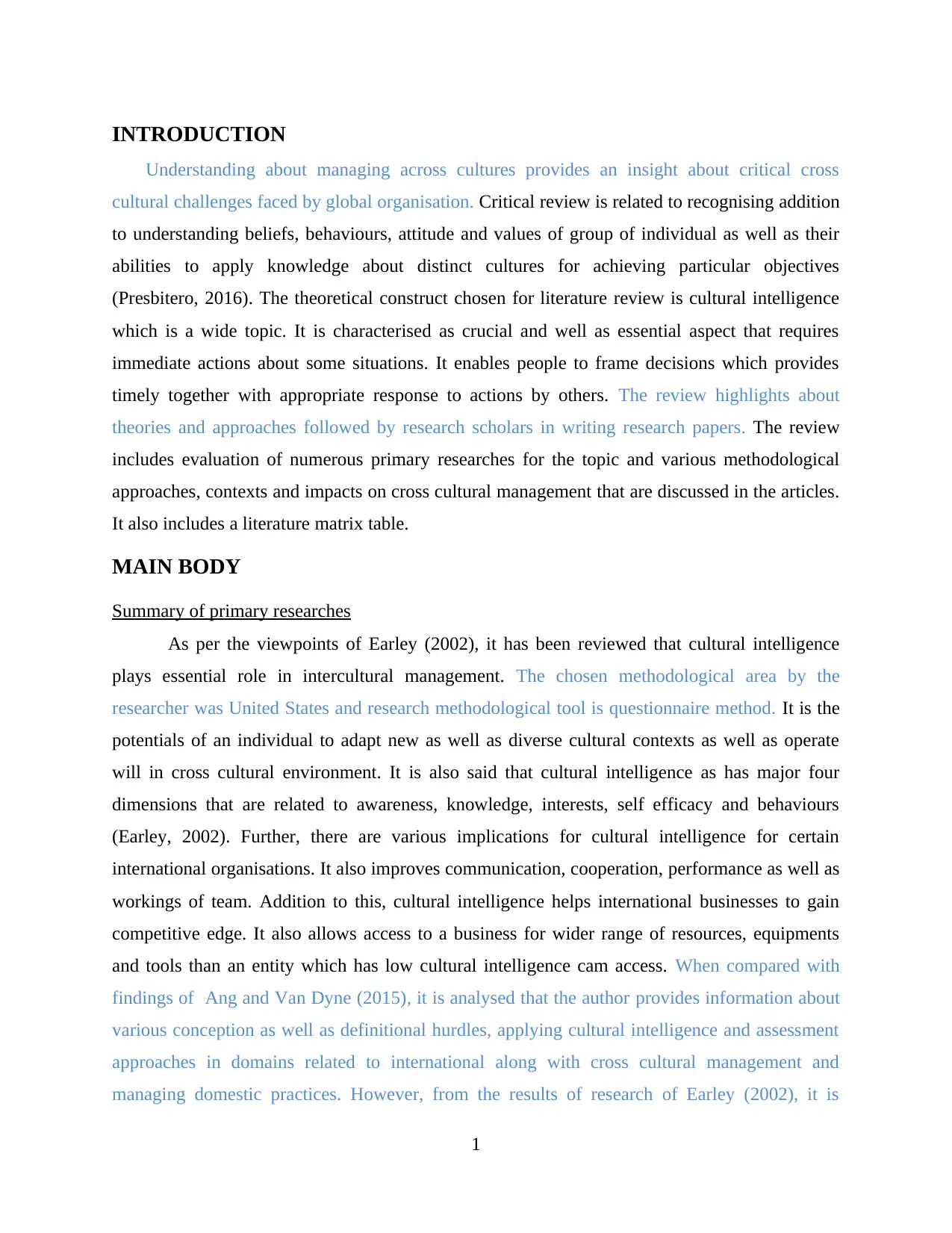
INTRODUCTION
Understanding about managing across cultures provides an insight about critical cross
cultural challenges faced by global organisation. Critical review is related to recognising addition
to understanding beliefs, behaviours, attitude and values of group of individual as well as their
abilities to apply knowledge about distinct cultures for achieving particular objectives
(Presbitero, 2016). The theoretical construct chosen for literature review is cultural intelligence
which is a wide topic. It is characterised as crucial and well as essential aspect that requires
immediate actions about some situations. It enables people to frame decisions which provides
timely together with appropriate response to actions by others. The review highlights about
theories and approaches followed by research scholars in writing research papers. The review
includes evaluation of numerous primary researches for the topic and various methodological
approaches, contexts and impacts on cross cultural management that are discussed in the articles.
It also includes a literature matrix table.
MAIN BODY
Summary of primary researches
As per the viewpoints of Earley (2002), it has been reviewed that cultural intelligence
plays essential role in intercultural management. The chosen methodological area by the
researcher was United States and research methodological tool is questionnaire method. It is the
potentials of an individual to adapt new as well as diverse cultural contexts as well as operate
will in cross cultural environment. It is also said that cultural intelligence as has major four
dimensions that are related to awareness, knowledge, interests, self efficacy and behaviours
(Earley, 2002). Further, there are various implications for cultural intelligence for certain
international organisations. It also improves communication, cooperation, performance as well as
workings of team. Addition to this, cultural intelligence helps international businesses to gain
competitive edge. It also allows access to a business for wider range of resources, equipments
and tools than an entity which has low cultural intelligence cam access. When compared with
findings of Ang and Van Dyne (2015), it is analysed that the author provides information about
various conception as well as definitional hurdles, applying cultural intelligence and assessment
approaches in domains related to international along with cross cultural management and
managing domestic practices. However, from the results of research of Earley (2002), it is
1
Understanding about managing across cultures provides an insight about critical cross
cultural challenges faced by global organisation. Critical review is related to recognising addition
to understanding beliefs, behaviours, attitude and values of group of individual as well as their
abilities to apply knowledge about distinct cultures for achieving particular objectives
(Presbitero, 2016). The theoretical construct chosen for literature review is cultural intelligence
which is a wide topic. It is characterised as crucial and well as essential aspect that requires
immediate actions about some situations. It enables people to frame decisions which provides
timely together with appropriate response to actions by others. The review highlights about
theories and approaches followed by research scholars in writing research papers. The review
includes evaluation of numerous primary researches for the topic and various methodological
approaches, contexts and impacts on cross cultural management that are discussed in the articles.
It also includes a literature matrix table.
MAIN BODY
Summary of primary researches
As per the viewpoints of Earley (2002), it has been reviewed that cultural intelligence
plays essential role in intercultural management. The chosen methodological area by the
researcher was United States and research methodological tool is questionnaire method. It is the
potentials of an individual to adapt new as well as diverse cultural contexts as well as operate
will in cross cultural environment. It is also said that cultural intelligence as has major four
dimensions that are related to awareness, knowledge, interests, self efficacy and behaviours
(Earley, 2002). Further, there are various implications for cultural intelligence for certain
international organisations. It also improves communication, cooperation, performance as well as
workings of team. Addition to this, cultural intelligence helps international businesses to gain
competitive edge. It also allows access to a business for wider range of resources, equipments
and tools than an entity which has low cultural intelligence cam access. When compared with
findings of Ang and Van Dyne (2015), it is analysed that the author provides information about
various conception as well as definitional hurdles, applying cultural intelligence and assessment
approaches in domains related to international along with cross cultural management and
managing domestic practices. However, from the results of research of Earley (2002), it is
1
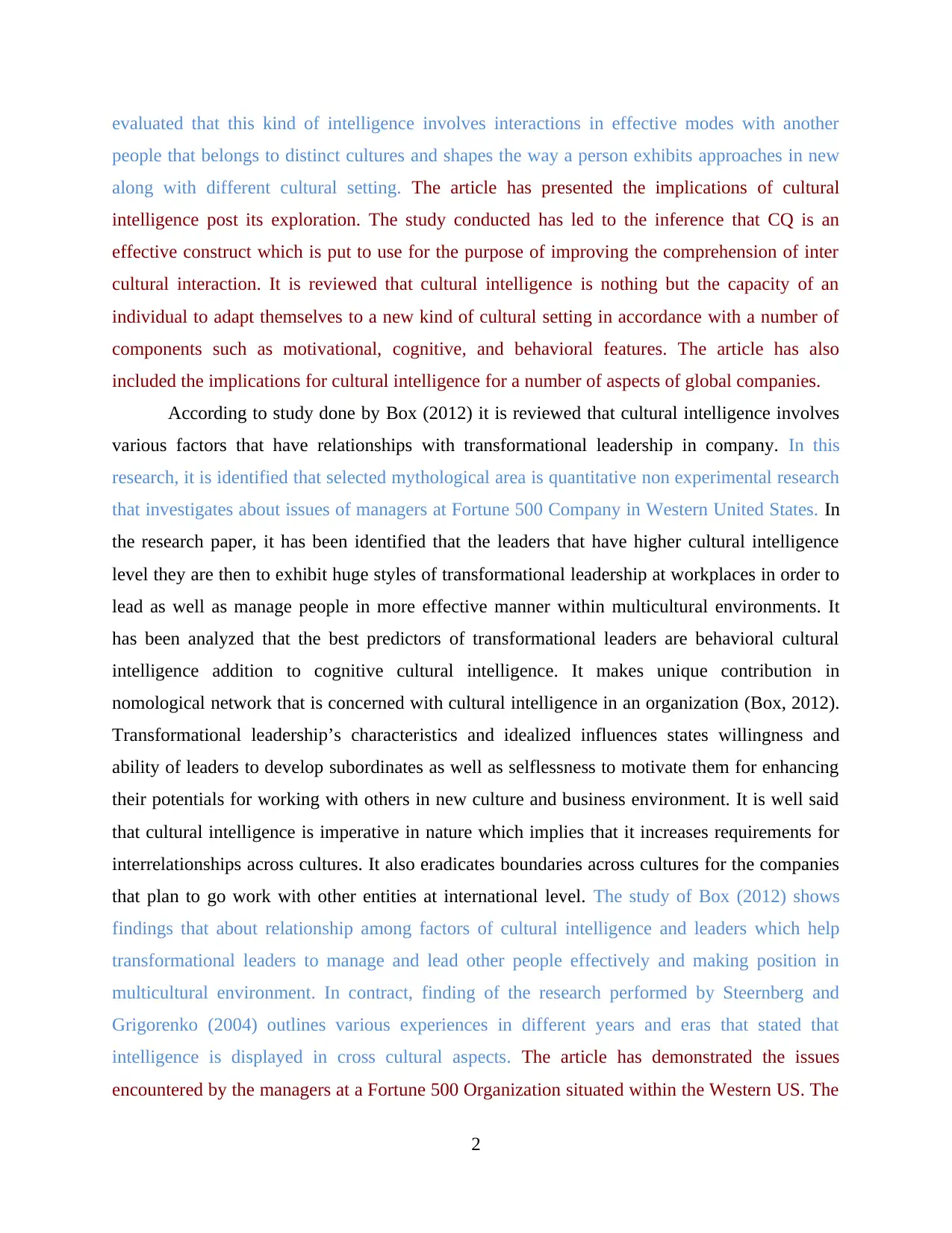
evaluated that this kind of intelligence involves interactions in effective modes with another
people that belongs to distinct cultures and shapes the way a person exhibits approaches in new
along with different cultural setting. The article has presented the implications of cultural
intelligence post its exploration. The study conducted has led to the inference that CQ is an
effective construct which is put to use for the purpose of improving the comprehension of inter
cultural interaction. It is reviewed that cultural intelligence is nothing but the capacity of an
individual to adapt themselves to a new kind of cultural setting in accordance with a number of
components such as motivational, cognitive, and behavioral features. The article has also
included the implications for cultural intelligence for a number of aspects of global companies.
According to study done by Box (2012) it is reviewed that cultural intelligence involves
various factors that have relationships with transformational leadership in company. In this
research, it is identified that selected mythological area is quantitative non experimental research
that investigates about issues of managers at Fortune 500 Company in Western United States. In
the research paper, it has been identified that the leaders that have higher cultural intelligence
level they are then to exhibit huge styles of transformational leadership at workplaces in order to
lead as well as manage people in more effective manner within multicultural environments. It
has been analyzed that the best predictors of transformational leaders are behavioral cultural
intelligence addition to cognitive cultural intelligence. It makes unique contribution in
nomological network that is concerned with cultural intelligence in an organization (Box, 2012).
Transformational leadership’s characteristics and idealized influences states willingness and
ability of leaders to develop subordinates as well as selflessness to motivate them for enhancing
their potentials for working with others in new culture and business environment. It is well said
that cultural intelligence is imperative in nature which implies that it increases requirements for
interrelationships across cultures. It also eradicates boundaries across cultures for the companies
that plan to go work with other entities at international level. The study of Box (2012) shows
findings that about relationship among factors of cultural intelligence and leaders which help
transformational leaders to manage and lead other people effectively and making position in
multicultural environment. In contract, finding of the research performed by Steernberg and
Grigorenko (2004) outlines various experiences in different years and eras that stated that
intelligence is displayed in cross cultural aspects. The article has demonstrated the issues
encountered by the managers at a Fortune 500 Organization situated within the Western US. The
2
people that belongs to distinct cultures and shapes the way a person exhibits approaches in new
along with different cultural setting. The article has presented the implications of cultural
intelligence post its exploration. The study conducted has led to the inference that CQ is an
effective construct which is put to use for the purpose of improving the comprehension of inter
cultural interaction. It is reviewed that cultural intelligence is nothing but the capacity of an
individual to adapt themselves to a new kind of cultural setting in accordance with a number of
components such as motivational, cognitive, and behavioral features. The article has also
included the implications for cultural intelligence for a number of aspects of global companies.
According to study done by Box (2012) it is reviewed that cultural intelligence involves
various factors that have relationships with transformational leadership in company. In this
research, it is identified that selected mythological area is quantitative non experimental research
that investigates about issues of managers at Fortune 500 Company in Western United States. In
the research paper, it has been identified that the leaders that have higher cultural intelligence
level they are then to exhibit huge styles of transformational leadership at workplaces in order to
lead as well as manage people in more effective manner within multicultural environments. It
has been analyzed that the best predictors of transformational leaders are behavioral cultural
intelligence addition to cognitive cultural intelligence. It makes unique contribution in
nomological network that is concerned with cultural intelligence in an organization (Box, 2012).
Transformational leadership’s characteristics and idealized influences states willingness and
ability of leaders to develop subordinates as well as selflessness to motivate them for enhancing
their potentials for working with others in new culture and business environment. It is well said
that cultural intelligence is imperative in nature which implies that it increases requirements for
interrelationships across cultures. It also eradicates boundaries across cultures for the companies
that plan to go work with other entities at international level. The study of Box (2012) shows
findings that about relationship among factors of cultural intelligence and leaders which help
transformational leaders to manage and lead other people effectively and making position in
multicultural environment. In contract, finding of the research performed by Steernberg and
Grigorenko (2004) outlines various experiences in different years and eras that stated that
intelligence is displayed in cross cultural aspects. The article has demonstrated the issues
encountered by the managers at a Fortune 500 Organization situated within the Western US. The
2
Secure Best Marks with AI Grader
Need help grading? Try our AI Grader for instant feedback on your assignments.
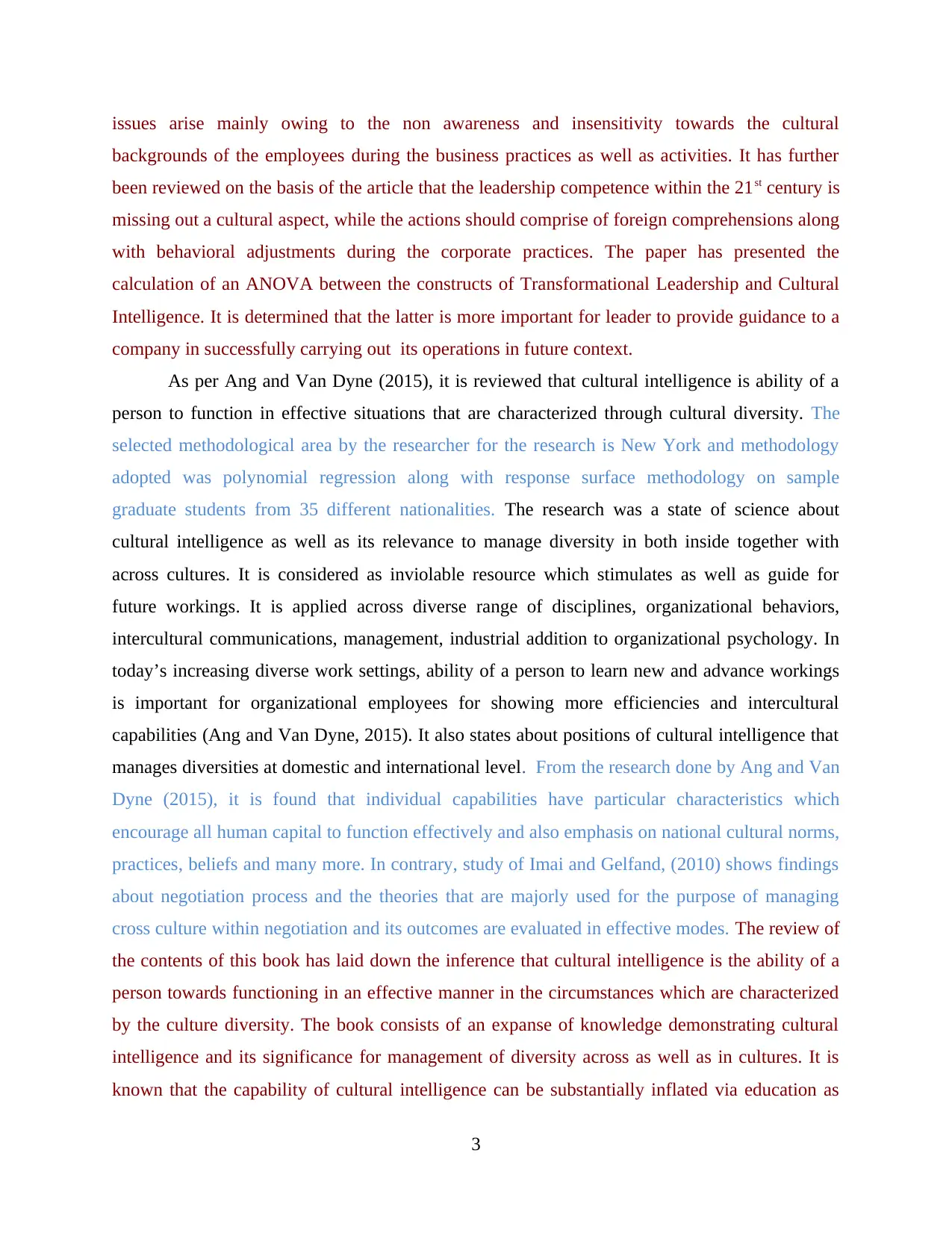
issues arise mainly owing to the non awareness and insensitivity towards the cultural
backgrounds of the employees during the business practices as well as activities. It has further
been reviewed on the basis of the article that the leadership competence within the 21st century is
missing out a cultural aspect, while the actions should comprise of foreign comprehensions along
with behavioral adjustments during the corporate practices. The paper has presented the
calculation of an ANOVA between the constructs of Transformational Leadership and Cultural
Intelligence. It is determined that the latter is more important for leader to provide guidance to a
company in successfully carrying out its operations in future context.
As per Ang and Van Dyne (2015), it is reviewed that cultural intelligence is ability of a
person to function in effective situations that are characterized through cultural diversity. The
selected methodological area by the researcher for the research is New York and methodology
adopted was polynomial regression along with response surface methodology on sample
graduate students from 35 different nationalities. The research was a state of science about
cultural intelligence as well as its relevance to manage diversity in both inside together with
across cultures. It is considered as inviolable resource which stimulates as well as guide for
future workings. It is applied across diverse range of disciplines, organizational behaviors,
intercultural communications, management, industrial addition to organizational psychology. In
today’s increasing diverse work settings, ability of a person to learn new and advance workings
is important for organizational employees for showing more efficiencies and intercultural
capabilities (Ang and Van Dyne, 2015). It also states about positions of cultural intelligence that
manages diversities at domestic and international level. From the research done by Ang and Van
Dyne (2015), it is found that individual capabilities have particular characteristics which
encourage all human capital to function effectively and also emphasis on national cultural norms,
practices, beliefs and many more. In contrary, study of Imai and Gelfand, (2010) shows findings
about negotiation process and the theories that are majorly used for the purpose of managing
cross culture within negotiation and its outcomes are evaluated in effective modes. The review of
the contents of this book has laid down the inference that cultural intelligence is the ability of a
person towards functioning in an effective manner in the circumstances which are characterized
by the culture diversity. The book consists of an expanse of knowledge demonstrating cultural
intelligence and its significance for management of diversity across as well as in cultures. It is
known that the capability of cultural intelligence can be substantially inflated via education as
3
backgrounds of the employees during the business practices as well as activities. It has further
been reviewed on the basis of the article that the leadership competence within the 21st century is
missing out a cultural aspect, while the actions should comprise of foreign comprehensions along
with behavioral adjustments during the corporate practices. The paper has presented the
calculation of an ANOVA between the constructs of Transformational Leadership and Cultural
Intelligence. It is determined that the latter is more important for leader to provide guidance to a
company in successfully carrying out its operations in future context.
As per Ang and Van Dyne (2015), it is reviewed that cultural intelligence is ability of a
person to function in effective situations that are characterized through cultural diversity. The
selected methodological area by the researcher for the research is New York and methodology
adopted was polynomial regression along with response surface methodology on sample
graduate students from 35 different nationalities. The research was a state of science about
cultural intelligence as well as its relevance to manage diversity in both inside together with
across cultures. It is considered as inviolable resource which stimulates as well as guide for
future workings. It is applied across diverse range of disciplines, organizational behaviors,
intercultural communications, management, industrial addition to organizational psychology. In
today’s increasing diverse work settings, ability of a person to learn new and advance workings
is important for organizational employees for showing more efficiencies and intercultural
capabilities (Ang and Van Dyne, 2015). It also states about positions of cultural intelligence that
manages diversities at domestic and international level. From the research done by Ang and Van
Dyne (2015), it is found that individual capabilities have particular characteristics which
encourage all human capital to function effectively and also emphasis on national cultural norms,
practices, beliefs and many more. In contrary, study of Imai and Gelfand, (2010) shows findings
about negotiation process and the theories that are majorly used for the purpose of managing
cross culture within negotiation and its outcomes are evaluated in effective modes. The review of
the contents of this book has laid down the inference that cultural intelligence is the ability of a
person towards functioning in an effective manner in the circumstances which are characterized
by the culture diversity. The book consists of an expanse of knowledge demonstrating cultural
intelligence and its significance for management of diversity across as well as in cultures. It is
known that the capability of cultural intelligence can be substantially inflated via education as
3
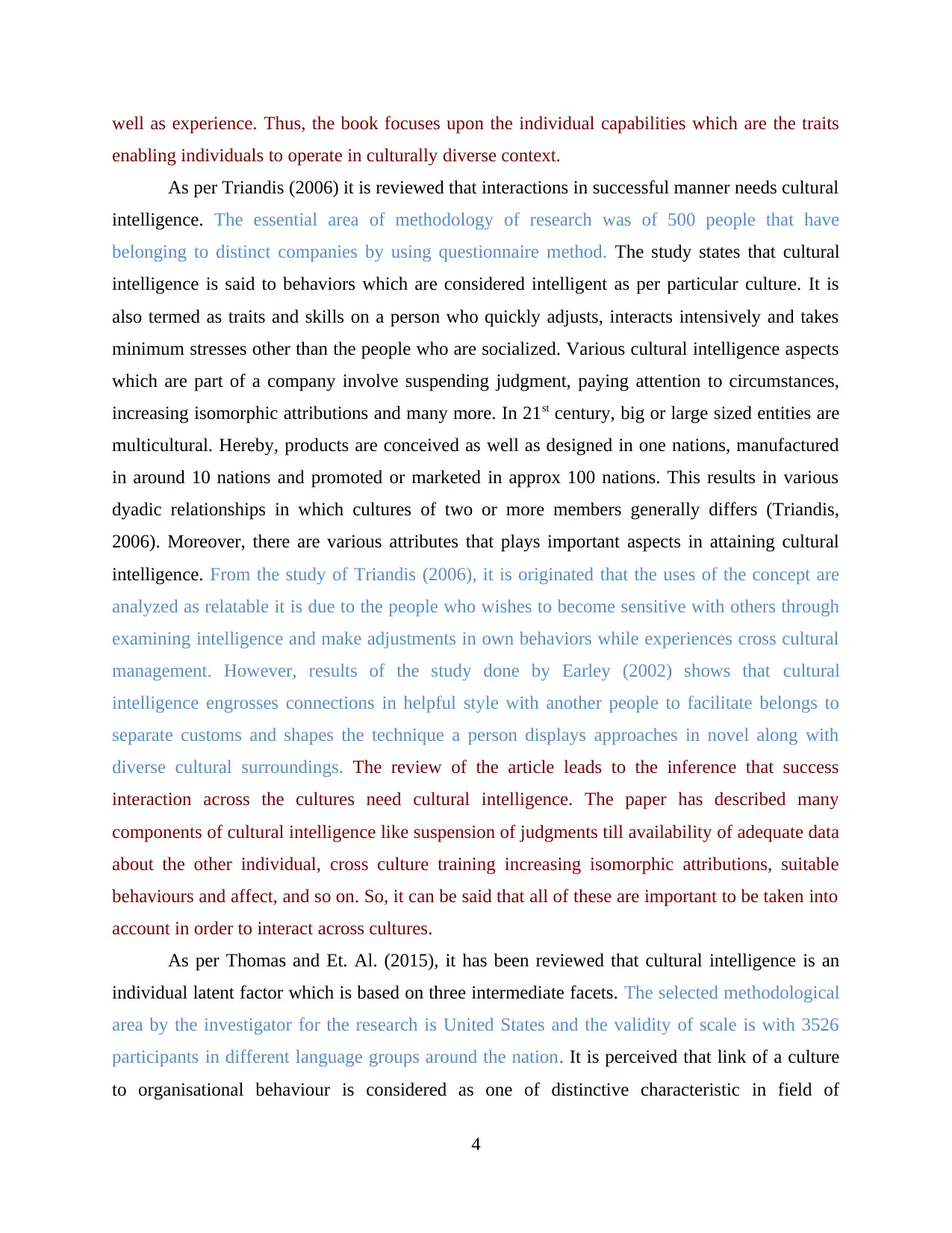
well as experience. Thus, the book focuses upon the individual capabilities which are the traits
enabling individuals to operate in culturally diverse context.
As per Triandis (2006) it is reviewed that interactions in successful manner needs cultural
intelligence. The essential area of methodology of research was of 500 people that have
belonging to distinct companies by using questionnaire method. The study states that cultural
intelligence is said to behaviors which are considered intelligent as per particular culture. It is
also termed as traits and skills on a person who quickly adjusts, interacts intensively and takes
minimum stresses other than the people who are socialized. Various cultural intelligence aspects
which are part of a company involve suspending judgment, paying attention to circumstances,
increasing isomorphic attributions and many more. In 21st century, big or large sized entities are
multicultural. Hereby, products are conceived as well as designed in one nations, manufactured
in around 10 nations and promoted or marketed in approx 100 nations. This results in various
dyadic relationships in which cultures of two or more members generally differs (Triandis,
2006). Moreover, there are various attributes that plays important aspects in attaining cultural
intelligence. From the study of Triandis (2006), it is originated that the uses of the concept are
analyzed as relatable it is due to the people who wishes to become sensitive with others through
examining intelligence and make adjustments in own behaviors while experiences cross cultural
management. However, results of the study done by Earley (2002) shows that cultural
intelligence engrosses connections in helpful style with another people to facilitate belongs to
separate customs and shapes the technique a person displays approaches in novel along with
diverse cultural surroundings. The review of the article leads to the inference that success
interaction across the cultures need cultural intelligence. The paper has described many
components of cultural intelligence like suspension of judgments till availability of adequate data
about the other individual, cross culture training increasing isomorphic attributions, suitable
behaviours and affect, and so on. So, it can be said that all of these are important to be taken into
account in order to interact across cultures.
As per Thomas and Et. Al. (2015), it has been reviewed that cultural intelligence is an
individual latent factor which is based on three intermediate facets. The selected methodological
area by the investigator for the research is United States and the validity of scale is with 3526
participants in different language groups around the nation. It is perceived that link of a culture
to organisational behaviour is considered as one of distinctive characteristic in field of
4
enabling individuals to operate in culturally diverse context.
As per Triandis (2006) it is reviewed that interactions in successful manner needs cultural
intelligence. The essential area of methodology of research was of 500 people that have
belonging to distinct companies by using questionnaire method. The study states that cultural
intelligence is said to behaviors which are considered intelligent as per particular culture. It is
also termed as traits and skills on a person who quickly adjusts, interacts intensively and takes
minimum stresses other than the people who are socialized. Various cultural intelligence aspects
which are part of a company involve suspending judgment, paying attention to circumstances,
increasing isomorphic attributions and many more. In 21st century, big or large sized entities are
multicultural. Hereby, products are conceived as well as designed in one nations, manufactured
in around 10 nations and promoted or marketed in approx 100 nations. This results in various
dyadic relationships in which cultures of two or more members generally differs (Triandis,
2006). Moreover, there are various attributes that plays important aspects in attaining cultural
intelligence. From the study of Triandis (2006), it is originated that the uses of the concept are
analyzed as relatable it is due to the people who wishes to become sensitive with others through
examining intelligence and make adjustments in own behaviors while experiences cross cultural
management. However, results of the study done by Earley (2002) shows that cultural
intelligence engrosses connections in helpful style with another people to facilitate belongs to
separate customs and shapes the technique a person displays approaches in novel along with
diverse cultural surroundings. The review of the article leads to the inference that success
interaction across the cultures need cultural intelligence. The paper has described many
components of cultural intelligence like suspension of judgments till availability of adequate data
about the other individual, cross culture training increasing isomorphic attributions, suitable
behaviours and affect, and so on. So, it can be said that all of these are important to be taken into
account in order to interact across cultures.
As per Thomas and Et. Al. (2015), it has been reviewed that cultural intelligence is an
individual latent factor which is based on three intermediate facets. The selected methodological
area by the investigator for the research is United States and the validity of scale is with 3526
participants in different language groups around the nation. It is perceived that link of a culture
to organisational behaviour is considered as one of distinctive characteristic in field of
4
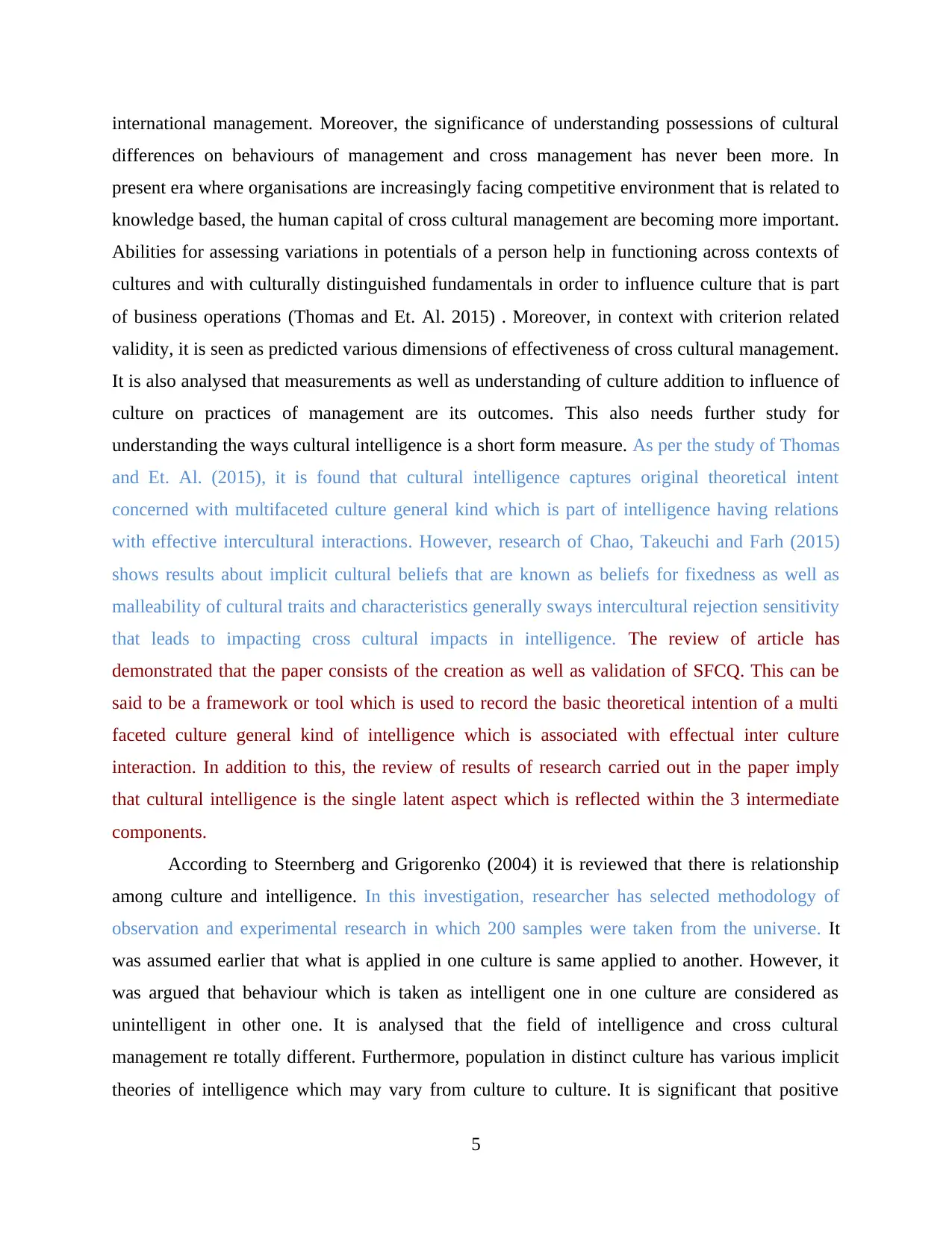
international management. Moreover, the significance of understanding possessions of cultural
differences on behaviours of management and cross management has never been more. In
present era where organisations are increasingly facing competitive environment that is related to
knowledge based, the human capital of cross cultural management are becoming more important.
Abilities for assessing variations in potentials of a person help in functioning across contexts of
cultures and with culturally distinguished fundamentals in order to influence culture that is part
of business operations (Thomas and Et. Al. 2015) . Moreover, in context with criterion related
validity, it is seen as predicted various dimensions of effectiveness of cross cultural management.
It is also analysed that measurements as well as understanding of culture addition to influence of
culture on practices of management are its outcomes. This also needs further study for
understanding the ways cultural intelligence is a short form measure. As per the study of Thomas
and Et. Al. (2015), it is found that cultural intelligence captures original theoretical intent
concerned with multifaceted culture general kind which is part of intelligence having relations
with effective intercultural interactions. However, research of Chao, Takeuchi and Farh (2015)
shows results about implicit cultural beliefs that are known as beliefs for fixedness as well as
malleability of cultural traits and characteristics generally sways intercultural rejection sensitivity
that leads to impacting cross cultural impacts in intelligence. The review of article has
demonstrated that the paper consists of the creation as well as validation of SFCQ. This can be
said to be a framework or tool which is used to record the basic theoretical intention of a multi
faceted culture general kind of intelligence which is associated with effectual inter culture
interaction. In addition to this, the review of results of research carried out in the paper imply
that cultural intelligence is the single latent aspect which is reflected within the 3 intermediate
components.
According to Steernberg and Grigorenko (2004) it is reviewed that there is relationship
among culture and intelligence. In this investigation, researcher has selected methodology of
observation and experimental research in which 200 samples were taken from the universe. It
was assumed earlier that what is applied in one culture is same applied to another. However, it
was argued that behaviour which is taken as intelligent one in one culture are considered as
unintelligent in other one. It is analysed that the field of intelligence and cross cultural
management re totally different. Furthermore, population in distinct culture has various implicit
theories of intelligence which may vary from culture to culture. It is significant that positive
5
differences on behaviours of management and cross management has never been more. In
present era where organisations are increasingly facing competitive environment that is related to
knowledge based, the human capital of cross cultural management are becoming more important.
Abilities for assessing variations in potentials of a person help in functioning across contexts of
cultures and with culturally distinguished fundamentals in order to influence culture that is part
of business operations (Thomas and Et. Al. 2015) . Moreover, in context with criterion related
validity, it is seen as predicted various dimensions of effectiveness of cross cultural management.
It is also analysed that measurements as well as understanding of culture addition to influence of
culture on practices of management are its outcomes. This also needs further study for
understanding the ways cultural intelligence is a short form measure. As per the study of Thomas
and Et. Al. (2015), it is found that cultural intelligence captures original theoretical intent
concerned with multifaceted culture general kind which is part of intelligence having relations
with effective intercultural interactions. However, research of Chao, Takeuchi and Farh (2015)
shows results about implicit cultural beliefs that are known as beliefs for fixedness as well as
malleability of cultural traits and characteristics generally sways intercultural rejection sensitivity
that leads to impacting cross cultural impacts in intelligence. The review of article has
demonstrated that the paper consists of the creation as well as validation of SFCQ. This can be
said to be a framework or tool which is used to record the basic theoretical intention of a multi
faceted culture general kind of intelligence which is associated with effectual inter culture
interaction. In addition to this, the review of results of research carried out in the paper imply
that cultural intelligence is the single latent aspect which is reflected within the 3 intermediate
components.
According to Steernberg and Grigorenko (2004) it is reviewed that there is relationship
among culture and intelligence. In this investigation, researcher has selected methodology of
observation and experimental research in which 200 samples were taken from the universe. It
was assumed earlier that what is applied in one culture is same applied to another. However, it
was argued that behaviour which is taken as intelligent one in one culture are considered as
unintelligent in other one. It is analysed that the field of intelligence and cross cultural
management re totally different. Furthermore, population in distinct culture has various implicit
theories of intelligence which may vary from culture to culture. It is significant that positive
5
Paraphrase This Document
Need a fresh take? Get an instant paraphrase of this document with our AI Paraphraser
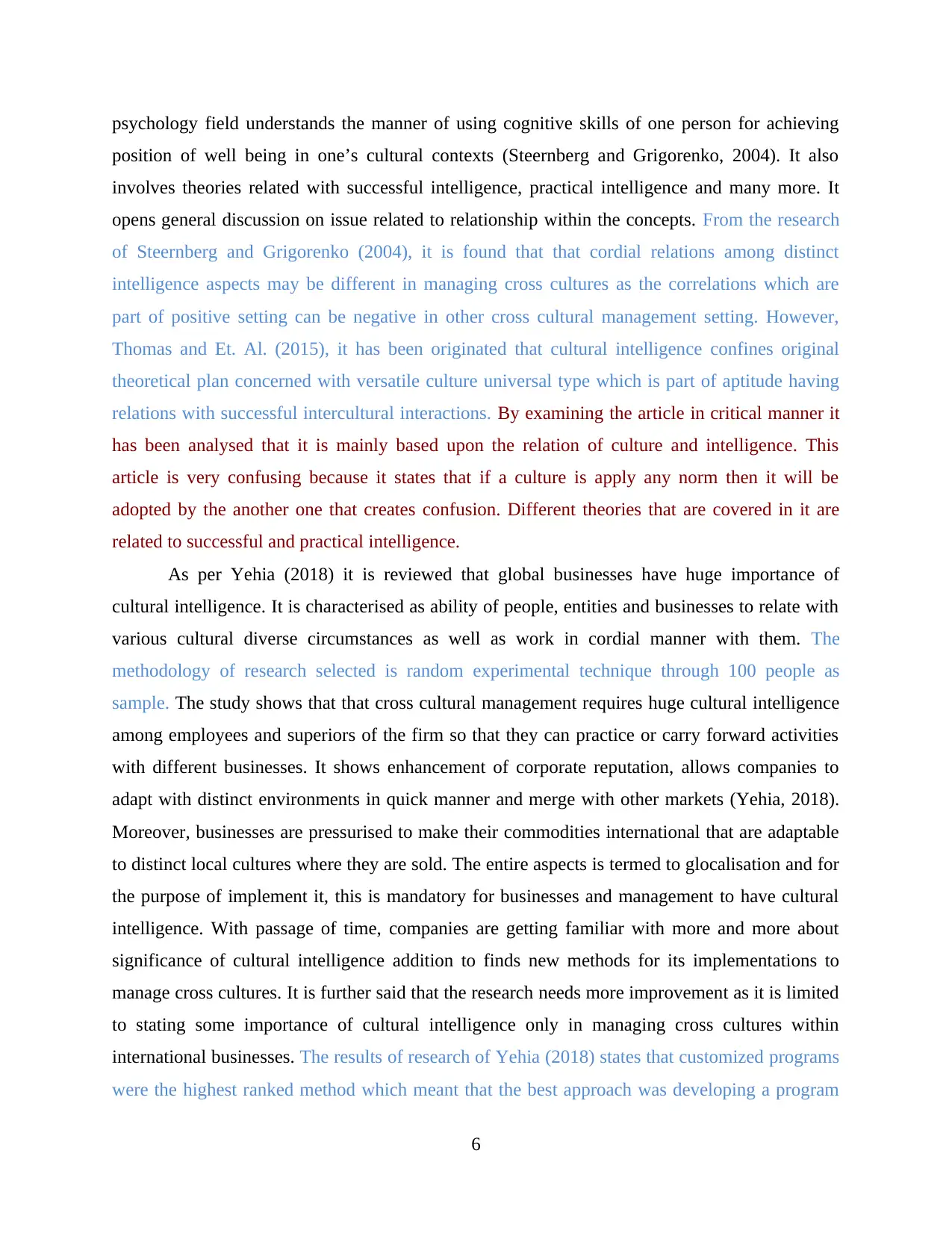
psychology field understands the manner of using cognitive skills of one person for achieving
position of well being in one’s cultural contexts (Steernberg and Grigorenko, 2004). It also
involves theories related with successful intelligence, practical intelligence and many more. It
opens general discussion on issue related to relationship within the concepts. From the research
of Steernberg and Grigorenko (2004), it is found that that cordial relations among distinct
intelligence aspects may be different in managing cross cultures as the correlations which are
part of positive setting can be negative in other cross cultural management setting. However,
Thomas and Et. Al. (2015), it has been originated that cultural intelligence confines original
theoretical plan concerned with versatile culture universal type which is part of aptitude having
relations with successful intercultural interactions. By examining the article in critical manner it
has been analysed that it is mainly based upon the relation of culture and intelligence. This
article is very confusing because it states that if a culture is apply any norm then it will be
adopted by the another one that creates confusion. Different theories that are covered in it are
related to successful and practical intelligence.
As per Yehia (2018) it is reviewed that global businesses have huge importance of
cultural intelligence. It is characterised as ability of people, entities and businesses to relate with
various cultural diverse circumstances as well as work in cordial manner with them. The
methodology of research selected is random experimental technique through 100 people as
sample. The study shows that that cross cultural management requires huge cultural intelligence
among employees and superiors of the firm so that they can practice or carry forward activities
with different businesses. It shows enhancement of corporate reputation, allows companies to
adapt with distinct environments in quick manner and merge with other markets (Yehia, 2018).
Moreover, businesses are pressurised to make their commodities international that are adaptable
to distinct local cultures where they are sold. The entire aspects is termed to glocalisation and for
the purpose of implement it, this is mandatory for businesses and management to have cultural
intelligence. With passage of time, companies are getting familiar with more and more about
significance of cultural intelligence addition to finds new methods for its implementations to
manage cross cultures. It is further said that the research needs more improvement as it is limited
to stating some importance of cultural intelligence only in managing cross cultures within
international businesses. The results of research of Yehia (2018) states that customized programs
were the highest ranked method which meant that the best approach was developing a program
6
position of well being in one’s cultural contexts (Steernberg and Grigorenko, 2004). It also
involves theories related with successful intelligence, practical intelligence and many more. It
opens general discussion on issue related to relationship within the concepts. From the research
of Steernberg and Grigorenko (2004), it is found that that cordial relations among distinct
intelligence aspects may be different in managing cross cultures as the correlations which are
part of positive setting can be negative in other cross cultural management setting. However,
Thomas and Et. Al. (2015), it has been originated that cultural intelligence confines original
theoretical plan concerned with versatile culture universal type which is part of aptitude having
relations with successful intercultural interactions. By examining the article in critical manner it
has been analysed that it is mainly based upon the relation of culture and intelligence. This
article is very confusing because it states that if a culture is apply any norm then it will be
adopted by the another one that creates confusion. Different theories that are covered in it are
related to successful and practical intelligence.
As per Yehia (2018) it is reviewed that global businesses have huge importance of
cultural intelligence. It is characterised as ability of people, entities and businesses to relate with
various cultural diverse circumstances as well as work in cordial manner with them. The
methodology of research selected is random experimental technique through 100 people as
sample. The study shows that that cross cultural management requires huge cultural intelligence
among employees and superiors of the firm so that they can practice or carry forward activities
with different businesses. It shows enhancement of corporate reputation, allows companies to
adapt with distinct environments in quick manner and merge with other markets (Yehia, 2018).
Moreover, businesses are pressurised to make their commodities international that are adaptable
to distinct local cultures where they are sold. The entire aspects is termed to glocalisation and for
the purpose of implement it, this is mandatory for businesses and management to have cultural
intelligence. With passage of time, companies are getting familiar with more and more about
significance of cultural intelligence addition to finds new methods for its implementations to
manage cross cultures. It is further said that the research needs more improvement as it is limited
to stating some importance of cultural intelligence only in managing cross cultures within
international businesses. The results of research of Yehia (2018) states that customized programs
were the highest ranked method which meant that the best approach was developing a program
6
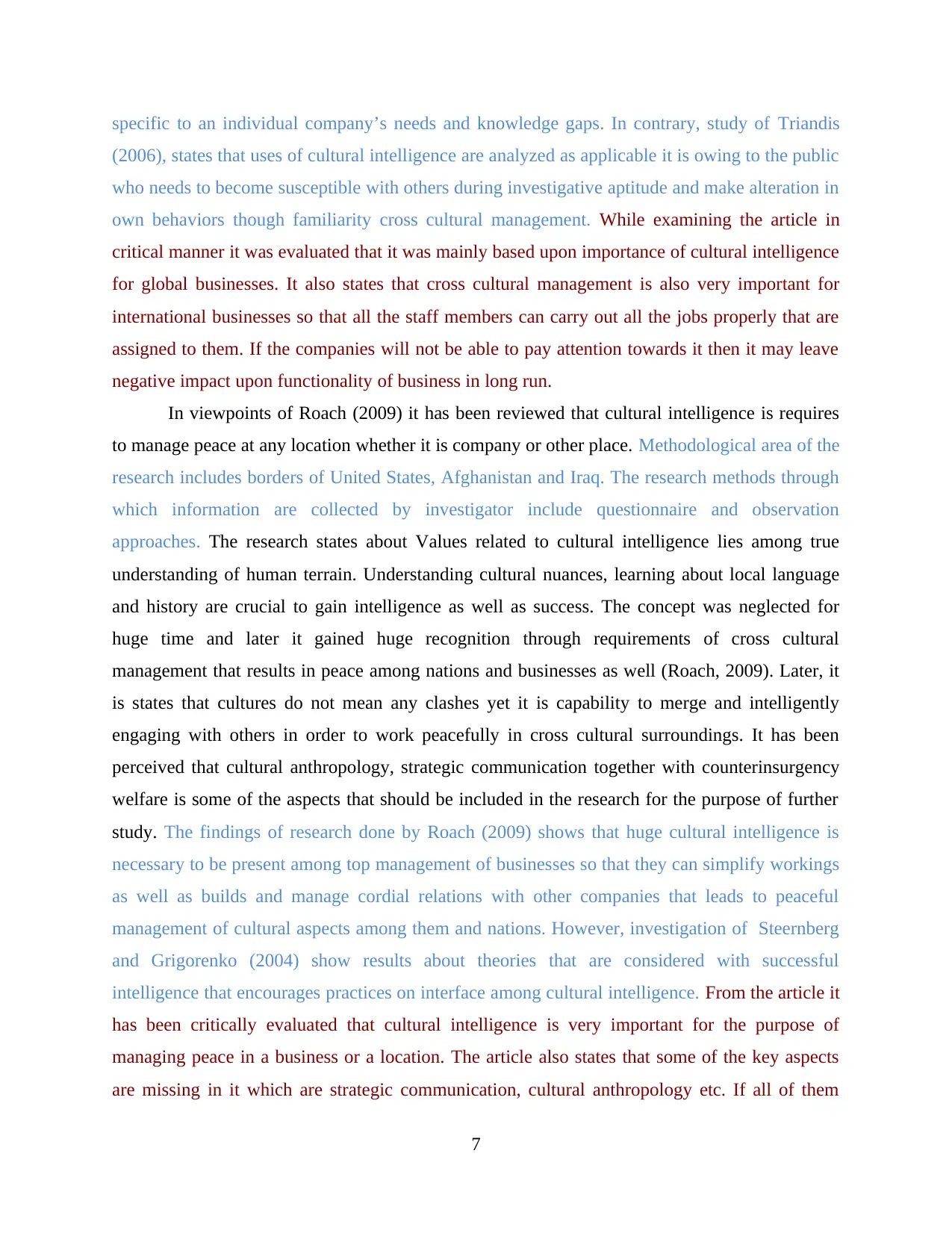
specific to an individual company’s needs and knowledge gaps. In contrary, study of Triandis
(2006), states that uses of cultural intelligence are analyzed as applicable it is owing to the public
who needs to become susceptible with others during investigative aptitude and make alteration in
own behaviors though familiarity cross cultural management. While examining the article in
critical manner it was evaluated that it was mainly based upon importance of cultural intelligence
for global businesses. It also states that cross cultural management is also very important for
international businesses so that all the staff members can carry out all the jobs properly that are
assigned to them. If the companies will not be able to pay attention towards it then it may leave
negative impact upon functionality of business in long run.
In viewpoints of Roach (2009) it has been reviewed that cultural intelligence is requires
to manage peace at any location whether it is company or other place. Methodological area of the
research includes borders of United States, Afghanistan and Iraq. The research methods through
which information are collected by investigator include questionnaire and observation
approaches. The research states about Values related to cultural intelligence lies among true
understanding of human terrain. Understanding cultural nuances, learning about local language
and history are crucial to gain intelligence as well as success. The concept was neglected for
huge time and later it gained huge recognition through requirements of cross cultural
management that results in peace among nations and businesses as well (Roach, 2009). Later, it
is states that cultures do not mean any clashes yet it is capability to merge and intelligently
engaging with others in order to work peacefully in cross cultural surroundings. It has been
perceived that cultural anthropology, strategic communication together with counterinsurgency
welfare is some of the aspects that should be included in the research for the purpose of further
study. The findings of research done by Roach (2009) shows that huge cultural intelligence is
necessary to be present among top management of businesses so that they can simplify workings
as well as builds and manage cordial relations with other companies that leads to peaceful
management of cultural aspects among them and nations. However, investigation of Steernberg
and Grigorenko (2004) show results about theories that are considered with successful
intelligence that encourages practices on interface among cultural intelligence. From the article it
has been critically evaluated that cultural intelligence is very important for the purpose of
managing peace in a business or a location. The article also states that some of the key aspects
are missing in it which are strategic communication, cultural anthropology etc. If all of them
7
(2006), states that uses of cultural intelligence are analyzed as applicable it is owing to the public
who needs to become susceptible with others during investigative aptitude and make alteration in
own behaviors though familiarity cross cultural management. While examining the article in
critical manner it was evaluated that it was mainly based upon importance of cultural intelligence
for global businesses. It also states that cross cultural management is also very important for
international businesses so that all the staff members can carry out all the jobs properly that are
assigned to them. If the companies will not be able to pay attention towards it then it may leave
negative impact upon functionality of business in long run.
In viewpoints of Roach (2009) it has been reviewed that cultural intelligence is requires
to manage peace at any location whether it is company or other place. Methodological area of the
research includes borders of United States, Afghanistan and Iraq. The research methods through
which information are collected by investigator include questionnaire and observation
approaches. The research states about Values related to cultural intelligence lies among true
understanding of human terrain. Understanding cultural nuances, learning about local language
and history are crucial to gain intelligence as well as success. The concept was neglected for
huge time and later it gained huge recognition through requirements of cross cultural
management that results in peace among nations and businesses as well (Roach, 2009). Later, it
is states that cultures do not mean any clashes yet it is capability to merge and intelligently
engaging with others in order to work peacefully in cross cultural surroundings. It has been
perceived that cultural anthropology, strategic communication together with counterinsurgency
welfare is some of the aspects that should be included in the research for the purpose of further
study. The findings of research done by Roach (2009) shows that huge cultural intelligence is
necessary to be present among top management of businesses so that they can simplify workings
as well as builds and manage cordial relations with other companies that leads to peaceful
management of cultural aspects among them and nations. However, investigation of Steernberg
and Grigorenko (2004) show results about theories that are considered with successful
intelligence that encourages practices on interface among cultural intelligence. From the article it
has been critically evaluated that cultural intelligence is very important for the purpose of
managing peace in a business or a location. The article also states that some of the key aspects
are missing in it which are strategic communication, cultural anthropology etc. If all of them
7
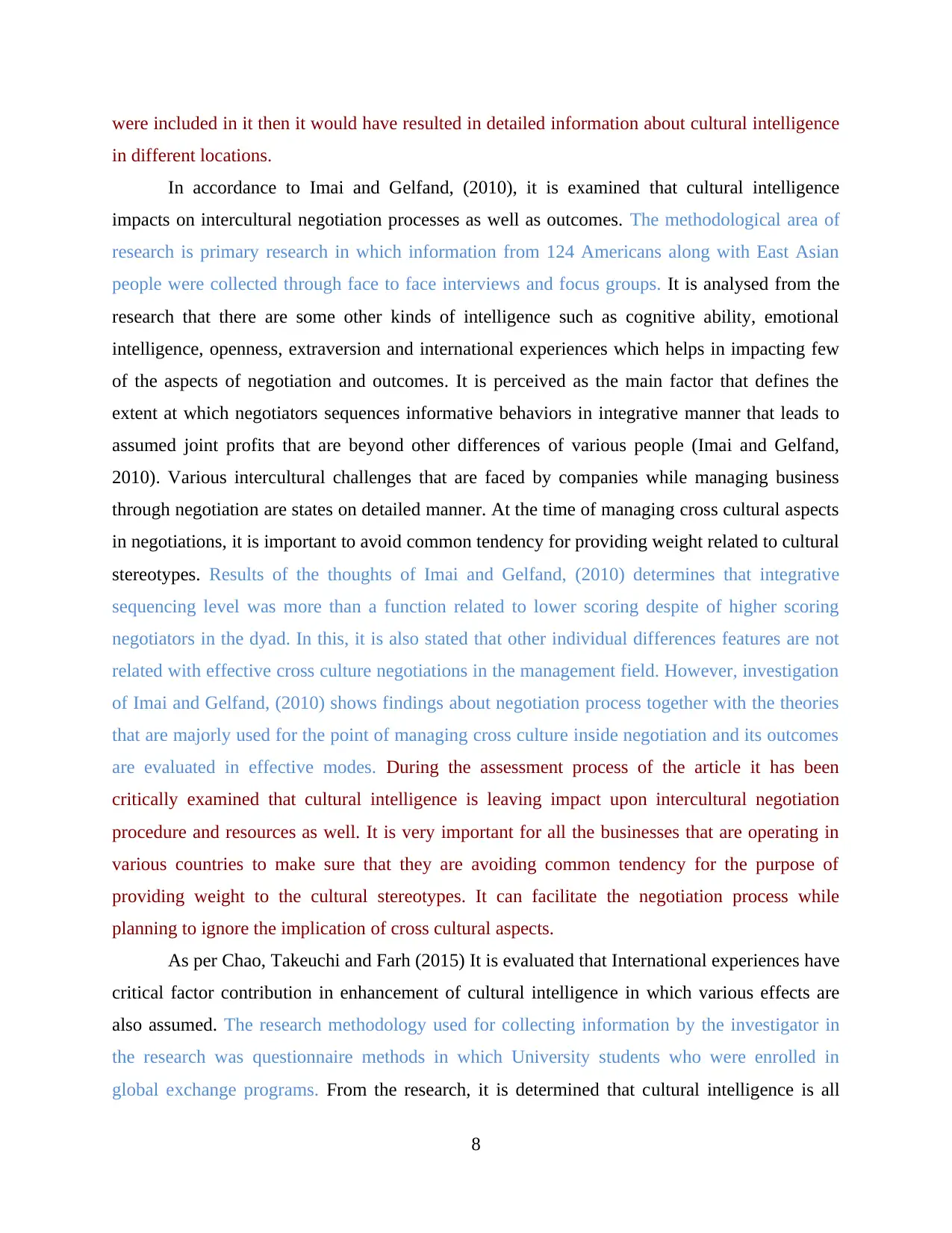
were included in it then it would have resulted in detailed information about cultural intelligence
in different locations.
In accordance to Imai and Gelfand, (2010), it is examined that cultural intelligence
impacts on intercultural negotiation processes as well as outcomes. The methodological area of
research is primary research in which information from 124 Americans along with East Asian
people were collected through face to face interviews and focus groups. It is analysed from the
research that there are some other kinds of intelligence such as cognitive ability, emotional
intelligence, openness, extraversion and international experiences which helps in impacting few
of the aspects of negotiation and outcomes. It is perceived as the main factor that defines the
extent at which negotiators sequences informative behaviors in integrative manner that leads to
assumed joint profits that are beyond other differences of various people (Imai and Gelfand,
2010). Various intercultural challenges that are faced by companies while managing business
through negotiation are states on detailed manner. At the time of managing cross cultural aspects
in negotiations, it is important to avoid common tendency for providing weight related to cultural
stereotypes. Results of the thoughts of Imai and Gelfand, (2010) determines that integrative
sequencing level was more than a function related to lower scoring despite of higher scoring
negotiators in the dyad. In this, it is also stated that other individual differences features are not
related with effective cross culture negotiations in the management field. However, investigation
of Imai and Gelfand, (2010) shows findings about negotiation process together with the theories
that are majorly used for the point of managing cross culture inside negotiation and its outcomes
are evaluated in effective modes. During the assessment process of the article it has been
critically examined that cultural intelligence is leaving impact upon intercultural negotiation
procedure and resources as well. It is very important for all the businesses that are operating in
various countries to make sure that they are avoiding common tendency for the purpose of
providing weight to the cultural stereotypes. It can facilitate the negotiation process while
planning to ignore the implication of cross cultural aspects.
As per Chao, Takeuchi and Farh (2015) It is evaluated that International experiences have
critical factor contribution in enhancement of cultural intelligence in which various effects are
also assumed. The research methodology used for collecting information by the investigator in
the research was questionnaire methods in which University students who were enrolled in
global exchange programs. From the research, it is determined that cultural intelligence is all
8
in different locations.
In accordance to Imai and Gelfand, (2010), it is examined that cultural intelligence
impacts on intercultural negotiation processes as well as outcomes. The methodological area of
research is primary research in which information from 124 Americans along with East Asian
people were collected through face to face interviews and focus groups. It is analysed from the
research that there are some other kinds of intelligence such as cognitive ability, emotional
intelligence, openness, extraversion and international experiences which helps in impacting few
of the aspects of negotiation and outcomes. It is perceived as the main factor that defines the
extent at which negotiators sequences informative behaviors in integrative manner that leads to
assumed joint profits that are beyond other differences of various people (Imai and Gelfand,
2010). Various intercultural challenges that are faced by companies while managing business
through negotiation are states on detailed manner. At the time of managing cross cultural aspects
in negotiations, it is important to avoid common tendency for providing weight related to cultural
stereotypes. Results of the thoughts of Imai and Gelfand, (2010) determines that integrative
sequencing level was more than a function related to lower scoring despite of higher scoring
negotiators in the dyad. In this, it is also stated that other individual differences features are not
related with effective cross culture negotiations in the management field. However, investigation
of Imai and Gelfand, (2010) shows findings about negotiation process together with the theories
that are majorly used for the point of managing cross culture inside negotiation and its outcomes
are evaluated in effective modes. During the assessment process of the article it has been
critically examined that cultural intelligence is leaving impact upon intercultural negotiation
procedure and resources as well. It is very important for all the businesses that are operating in
various countries to make sure that they are avoiding common tendency for the purpose of
providing weight to the cultural stereotypes. It can facilitate the negotiation process while
planning to ignore the implication of cross cultural aspects.
As per Chao, Takeuchi and Farh (2015) It is evaluated that International experiences have
critical factor contribution in enhancement of cultural intelligence in which various effects are
also assumed. The research methodology used for collecting information by the investigator in
the research was questionnaire methods in which University students who were enrolled in
global exchange programs. From the research, it is determined that cultural intelligence is all
8
Secure Best Marks with AI Grader
Need help grading? Try our AI Grader for instant feedback on your assignments.
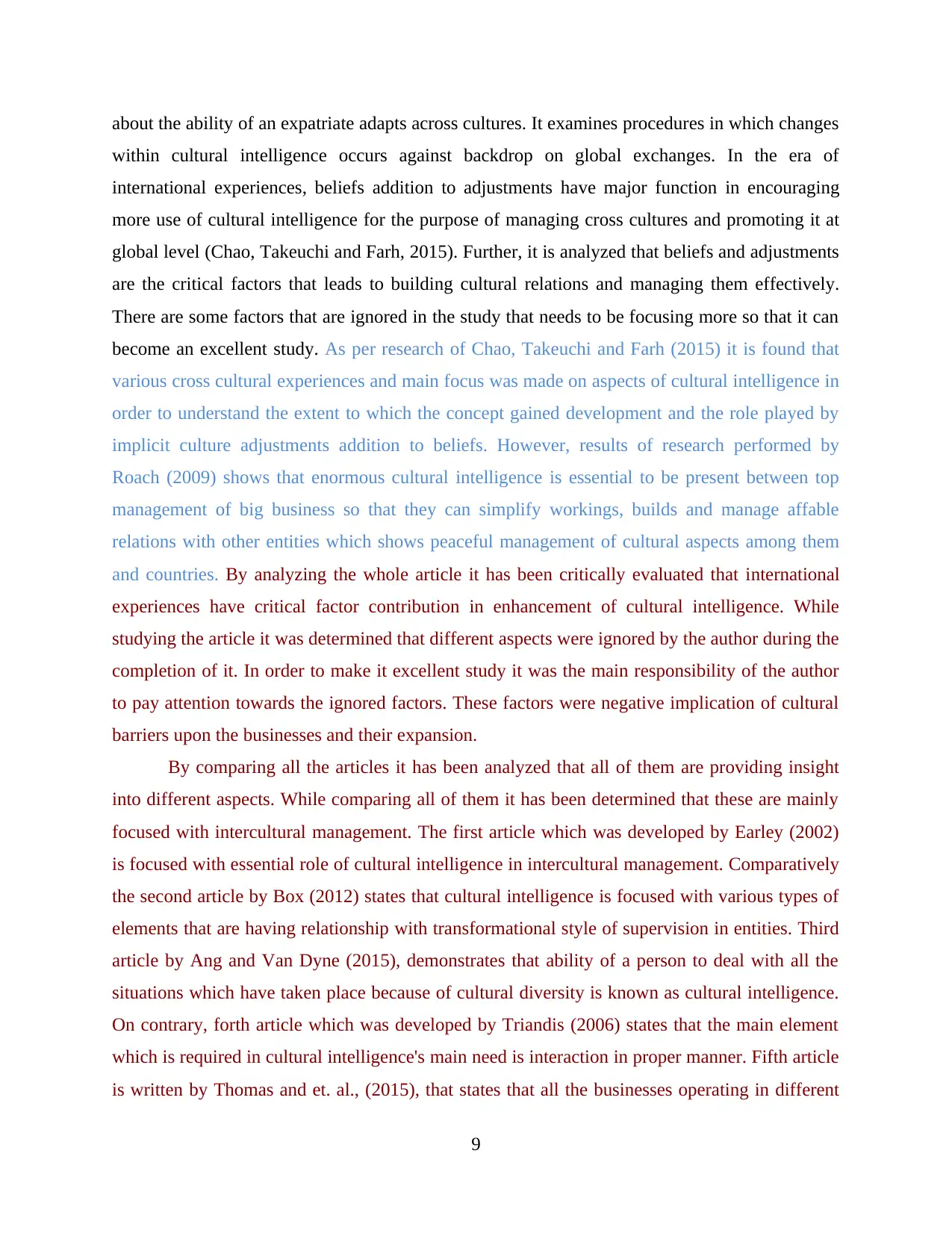
about the ability of an expatriate adapts across cultures. It examines procedures in which changes
within cultural intelligence occurs against backdrop on global exchanges. In the era of
international experiences, beliefs addition to adjustments have major function in encouraging
more use of cultural intelligence for the purpose of managing cross cultures and promoting it at
global level (Chao, Takeuchi and Farh, 2015). Further, it is analyzed that beliefs and adjustments
are the critical factors that leads to building cultural relations and managing them effectively.
There are some factors that are ignored in the study that needs to be focusing more so that it can
become an excellent study. As per research of Chao, Takeuchi and Farh (2015) it is found that
various cross cultural experiences and main focus was made on aspects of cultural intelligence in
order to understand the extent to which the concept gained development and the role played by
implicit culture adjustments addition to beliefs. However, results of research performed by
Roach (2009) shows that enormous cultural intelligence is essential to be present between top
management of big business so that they can simplify workings, builds and manage affable
relations with other entities which shows peaceful management of cultural aspects among them
and countries. By analyzing the whole article it has been critically evaluated that international
experiences have critical factor contribution in enhancement of cultural intelligence. While
studying the article it was determined that different aspects were ignored by the author during the
completion of it. In order to make it excellent study it was the main responsibility of the author
to pay attention towards the ignored factors. These factors were negative implication of cultural
barriers upon the businesses and their expansion.
By comparing all the articles it has been analyzed that all of them are providing insight
into different aspects. While comparing all of them it has been determined that these are mainly
focused with intercultural management. The first article which was developed by Earley (2002)
is focused with essential role of cultural intelligence in intercultural management. Comparatively
the second article by Box (2012) states that cultural intelligence is focused with various types of
elements that are having relationship with transformational style of supervision in entities. Third
article by Ang and Van Dyne (2015), demonstrates that ability of a person to deal with all the
situations which have taken place because of cultural diversity is known as cultural intelligence.
On contrary, forth article which was developed by Triandis (2006) states that the main element
which is required in cultural intelligence's main need is interaction in proper manner. Fifth article
is written by Thomas and et. al., (2015), that states that all the businesses operating in different
9
within cultural intelligence occurs against backdrop on global exchanges. In the era of
international experiences, beliefs addition to adjustments have major function in encouraging
more use of cultural intelligence for the purpose of managing cross cultures and promoting it at
global level (Chao, Takeuchi and Farh, 2015). Further, it is analyzed that beliefs and adjustments
are the critical factors that leads to building cultural relations and managing them effectively.
There are some factors that are ignored in the study that needs to be focusing more so that it can
become an excellent study. As per research of Chao, Takeuchi and Farh (2015) it is found that
various cross cultural experiences and main focus was made on aspects of cultural intelligence in
order to understand the extent to which the concept gained development and the role played by
implicit culture adjustments addition to beliefs. However, results of research performed by
Roach (2009) shows that enormous cultural intelligence is essential to be present between top
management of big business so that they can simplify workings, builds and manage affable
relations with other entities which shows peaceful management of cultural aspects among them
and countries. By analyzing the whole article it has been critically evaluated that international
experiences have critical factor contribution in enhancement of cultural intelligence. While
studying the article it was determined that different aspects were ignored by the author during the
completion of it. In order to make it excellent study it was the main responsibility of the author
to pay attention towards the ignored factors. These factors were negative implication of cultural
barriers upon the businesses and their expansion.
By comparing all the articles it has been analyzed that all of them are providing insight
into different aspects. While comparing all of them it has been determined that these are mainly
focused with intercultural management. The first article which was developed by Earley (2002)
is focused with essential role of cultural intelligence in intercultural management. Comparatively
the second article by Box (2012) states that cultural intelligence is focused with various types of
elements that are having relationship with transformational style of supervision in entities. Third
article by Ang and Van Dyne (2015), demonstrates that ability of a person to deal with all the
situations which have taken place because of cultural diversity is known as cultural intelligence.
On contrary, forth article which was developed by Triandis (2006) states that the main element
which is required in cultural intelligence's main need is interaction in proper manner. Fifth article
is written by Thomas and et. al., (2015), that states that all the businesses operating in different
9
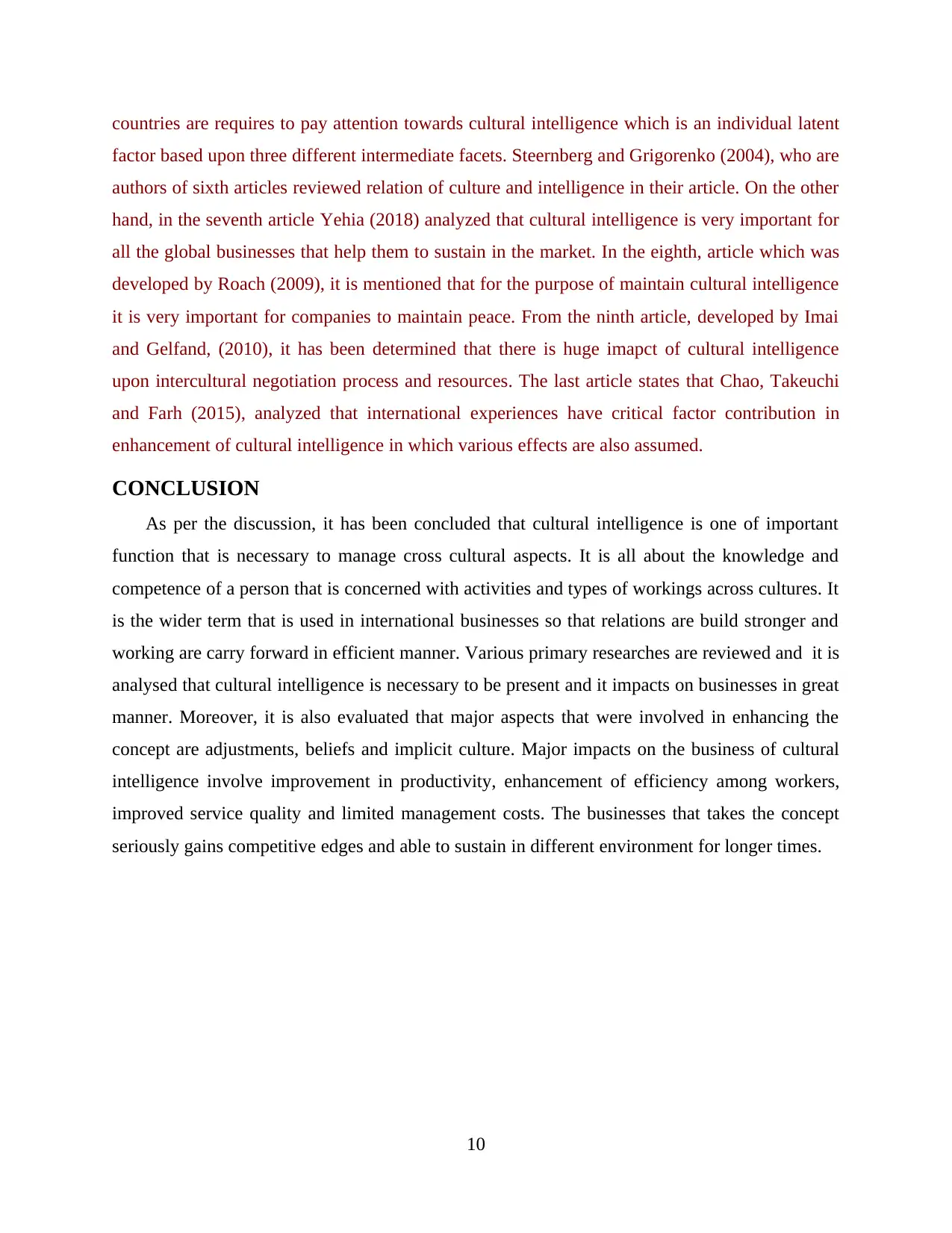
countries are requires to pay attention towards cultural intelligence which is an individual latent
factor based upon three different intermediate facets. Steernberg and Grigorenko (2004), who are
authors of sixth articles reviewed relation of culture and intelligence in their article. On the other
hand, in the seventh article Yehia (2018) analyzed that cultural intelligence is very important for
all the global businesses that help them to sustain in the market. In the eighth, article which was
developed by Roach (2009), it is mentioned that for the purpose of maintain cultural intelligence
it is very important for companies to maintain peace. From the ninth article, developed by Imai
and Gelfand, (2010), it has been determined that there is huge imapct of cultural intelligence
upon intercultural negotiation process and resources. The last article states that Chao, Takeuchi
and Farh (2015), analyzed that international experiences have critical factor contribution in
enhancement of cultural intelligence in which various effects are also assumed.
CONCLUSION
As per the discussion, it has been concluded that cultural intelligence is one of important
function that is necessary to manage cross cultural aspects. It is all about the knowledge and
competence of a person that is concerned with activities and types of workings across cultures. It
is the wider term that is used in international businesses so that relations are build stronger and
working are carry forward in efficient manner. Various primary researches are reviewed and it is
analysed that cultural intelligence is necessary to be present and it impacts on businesses in great
manner. Moreover, it is also evaluated that major aspects that were involved in enhancing the
concept are adjustments, beliefs and implicit culture. Major impacts on the business of cultural
intelligence involve improvement in productivity, enhancement of efficiency among workers,
improved service quality and limited management costs. The businesses that takes the concept
seriously gains competitive edges and able to sustain in different environment for longer times.
10
factor based upon three different intermediate facets. Steernberg and Grigorenko (2004), who are
authors of sixth articles reviewed relation of culture and intelligence in their article. On the other
hand, in the seventh article Yehia (2018) analyzed that cultural intelligence is very important for
all the global businesses that help them to sustain in the market. In the eighth, article which was
developed by Roach (2009), it is mentioned that for the purpose of maintain cultural intelligence
it is very important for companies to maintain peace. From the ninth article, developed by Imai
and Gelfand, (2010), it has been determined that there is huge imapct of cultural intelligence
upon intercultural negotiation process and resources. The last article states that Chao, Takeuchi
and Farh (2015), analyzed that international experiences have critical factor contribution in
enhancement of cultural intelligence in which various effects are also assumed.
CONCLUSION
As per the discussion, it has been concluded that cultural intelligence is one of important
function that is necessary to manage cross cultural aspects. It is all about the knowledge and
competence of a person that is concerned with activities and types of workings across cultures. It
is the wider term that is used in international businesses so that relations are build stronger and
working are carry forward in efficient manner. Various primary researches are reviewed and it is
analysed that cultural intelligence is necessary to be present and it impacts on businesses in great
manner. Moreover, it is also evaluated that major aspects that were involved in enhancing the
concept are adjustments, beliefs and implicit culture. Major impacts on the business of cultural
intelligence involve improvement in productivity, enhancement of efficiency among workers,
improved service quality and limited management costs. The businesses that takes the concept
seriously gains competitive edges and able to sustain in different environment for longer times.
10
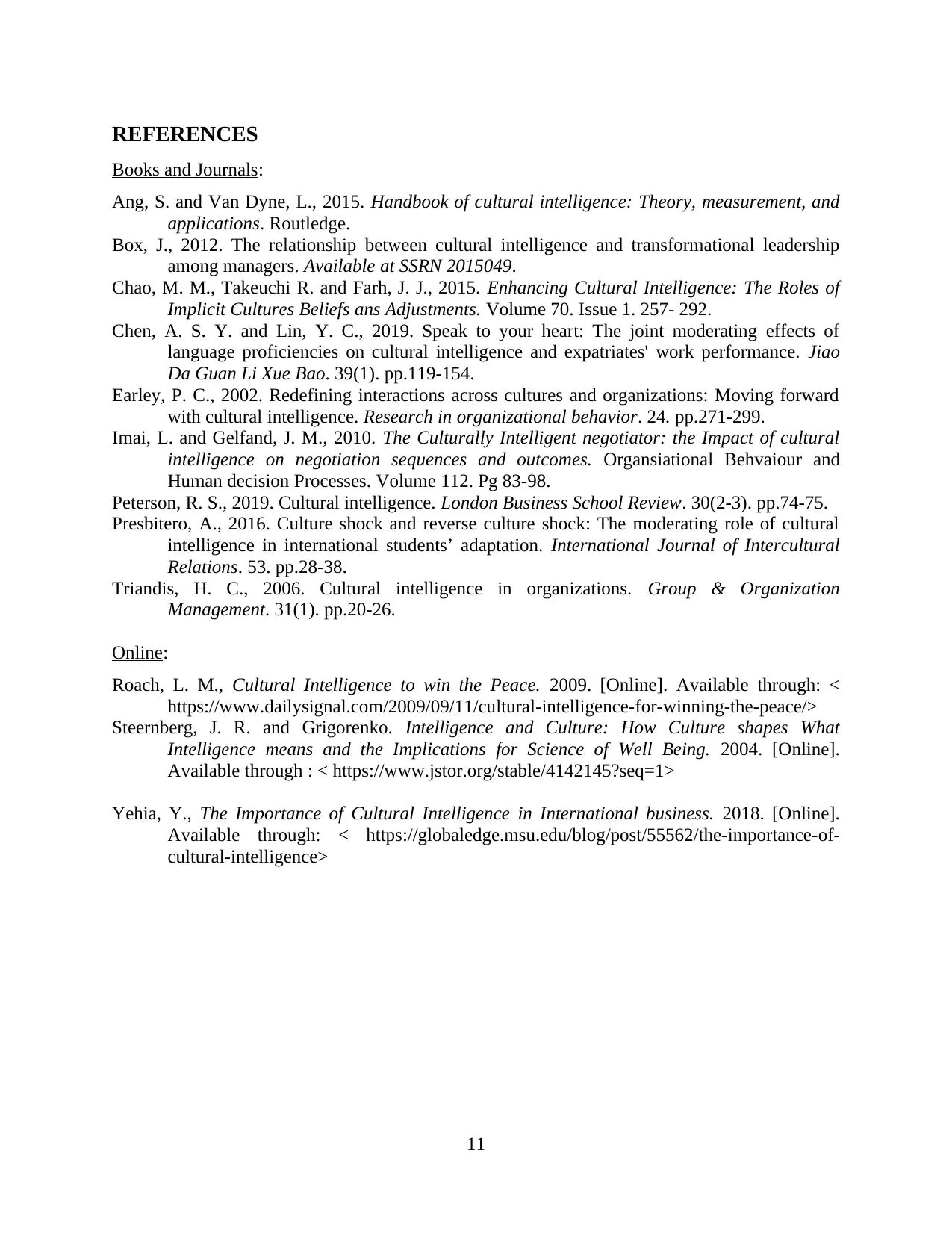
REFERENCES
Books and Journals:
Ang, S. and Van Dyne, L., 2015. Handbook of cultural intelligence: Theory, measurement, and
applications. Routledge.
Box, J., 2012. The relationship between cultural intelligence and transformational leadership
among managers. Available at SSRN 2015049.
Chao, M. M., Takeuchi R. and Farh, J. J., 2015. Enhancing Cultural Intelligence: The Roles of
Implicit Cultures Beliefs ans Adjustments. Volume 70. Issue 1. 257- 292.
Chen, A. S. Y. and Lin, Y. C., 2019. Speak to your heart: The joint moderating effects of
language proficiencies on cultural intelligence and expatriates' work performance. Jiao
Da Guan Li Xue Bao. 39(1). pp.119-154.
Earley, P. C., 2002. Redefining interactions across cultures and organizations: Moving forward
with cultural intelligence. Research in organizational behavior. 24. pp.271-299.
Imai, L. and Gelfand, J. M., 2010. The Culturally Intelligent negotiator: the Impact of cultural
intelligence on negotiation sequences and outcomes. Organsiational Behvaiour and
Human decision Processes. Volume 112. Pg 83-98.
Peterson, R. S., 2019. Cultural intelligence. London Business School Review. 30(2-3). pp.74-75.
Presbitero, A., 2016. Culture shock and reverse culture shock: The moderating role of cultural
intelligence in international students’ adaptation. International Journal of Intercultural
Relations. 53. pp.28-38.
Triandis, H. C., 2006. Cultural intelligence in organizations. Group & Organization
Management. 31(1). pp.20-26.
Online:
Roach, L. M., Cultural Intelligence to win the Peace. 2009. [Online]. Available through: <
https://www.dailysignal.com/2009/09/11/cultural-intelligence-for-winning-the-peace/>
Steernberg, J. R. and Grigorenko. Intelligence and Culture: How Culture shapes What
Intelligence means and the Implications for Science of Well Being. 2004. [Online].
Available through : < https://www.jstor.org/stable/4142145?seq=1>
Yehia, Y., The Importance of Cultural Intelligence in International business. 2018. [Online].
Available through: < https://globaledge.msu.edu/blog/post/55562/the-importance-of-
cultural-intelligence>
11
Books and Journals:
Ang, S. and Van Dyne, L., 2015. Handbook of cultural intelligence: Theory, measurement, and
applications. Routledge.
Box, J., 2012. The relationship between cultural intelligence and transformational leadership
among managers. Available at SSRN 2015049.
Chao, M. M., Takeuchi R. and Farh, J. J., 2015. Enhancing Cultural Intelligence: The Roles of
Implicit Cultures Beliefs ans Adjustments. Volume 70. Issue 1. 257- 292.
Chen, A. S. Y. and Lin, Y. C., 2019. Speak to your heart: The joint moderating effects of
language proficiencies on cultural intelligence and expatriates' work performance. Jiao
Da Guan Li Xue Bao. 39(1). pp.119-154.
Earley, P. C., 2002. Redefining interactions across cultures and organizations: Moving forward
with cultural intelligence. Research in organizational behavior. 24. pp.271-299.
Imai, L. and Gelfand, J. M., 2010. The Culturally Intelligent negotiator: the Impact of cultural
intelligence on negotiation sequences and outcomes. Organsiational Behvaiour and
Human decision Processes. Volume 112. Pg 83-98.
Peterson, R. S., 2019. Cultural intelligence. London Business School Review. 30(2-3). pp.74-75.
Presbitero, A., 2016. Culture shock and reverse culture shock: The moderating role of cultural
intelligence in international students’ adaptation. International Journal of Intercultural
Relations. 53. pp.28-38.
Triandis, H. C., 2006. Cultural intelligence in organizations. Group & Organization
Management. 31(1). pp.20-26.
Online:
Roach, L. M., Cultural Intelligence to win the Peace. 2009. [Online]. Available through: <
https://www.dailysignal.com/2009/09/11/cultural-intelligence-for-winning-the-peace/>
Steernberg, J. R. and Grigorenko. Intelligence and Culture: How Culture shapes What
Intelligence means and the Implications for Science of Well Being. 2004. [Online].
Available through : < https://www.jstor.org/stable/4142145?seq=1>
Yehia, Y., The Importance of Cultural Intelligence in International business. 2018. [Online].
Available through: < https://globaledge.msu.edu/blog/post/55562/the-importance-of-
cultural-intelligence>
11
Paraphrase This Document
Need a fresh take? Get an instant paraphrase of this document with our AI Paraphraser
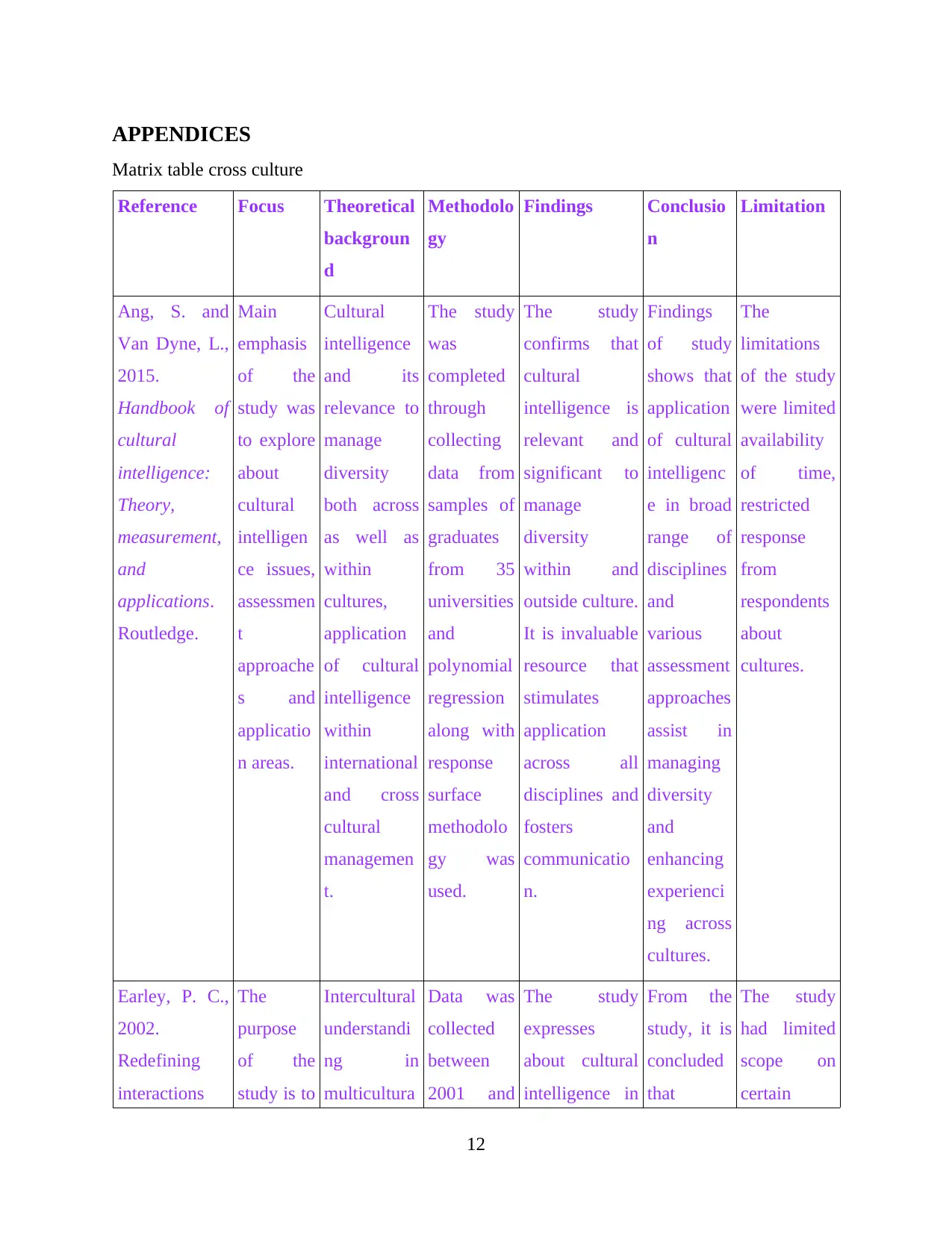
APPENDICES
Matrix table cross culture
Reference Focus Theoretical
backgroun
d
Methodolo
gy
Findings Conclusio
n
Limitation
Ang, S. and
Van Dyne, L.,
2015.
Handbook of
cultural
intelligence:
Theory,
measurement,
and
applications.
Routledge.
Main
emphasis
of the
study was
to explore
about
cultural
intelligen
ce issues,
assessmen
t
approache
s and
applicatio
n areas.
Cultural
intelligence
and its
relevance to
manage
diversity
both across
as well as
within
cultures,
application
of cultural
intelligence
within
international
and cross
cultural
managemen
t.
The study
was
completed
through
collecting
data from
samples of
graduates
from 35
universities
and
polynomial
regression
along with
response
surface
methodolo
gy was
used.
The study
confirms that
cultural
intelligence is
relevant and
significant to
manage
diversity
within and
outside culture.
It is invaluable
resource that
stimulates
application
across all
disciplines and
fosters
communicatio
n.
Findings
of study
shows that
application
of cultural
intelligenc
e in broad
range of
disciplines
and
various
assessment
approaches
assist in
managing
diversity
and
enhancing
experienci
ng across
cultures.
The
limitations
of the study
were limited
availability
of time,
restricted
response
from
respondents
about
cultures.
Earley, P. C.,
2002.
Redefining
interactions
The
purpose
of the
study is to
Intercultural
understandi
ng in
multicultura
Data was
collected
between
2001 and
The study
expresses
about cultural
intelligence in
From the
study, it is
concluded
that
The study
had limited
scope on
certain
12
Matrix table cross culture
Reference Focus Theoretical
backgroun
d
Methodolo
gy
Findings Conclusio
n
Limitation
Ang, S. and
Van Dyne, L.,
2015.
Handbook of
cultural
intelligence:
Theory,
measurement,
and
applications.
Routledge.
Main
emphasis
of the
study was
to explore
about
cultural
intelligen
ce issues,
assessmen
t
approache
s and
applicatio
n areas.
Cultural
intelligence
and its
relevance to
manage
diversity
both across
as well as
within
cultures,
application
of cultural
intelligence
within
international
and cross
cultural
managemen
t.
The study
was
completed
through
collecting
data from
samples of
graduates
from 35
universities
and
polynomial
regression
along with
response
surface
methodolo
gy was
used.
The study
confirms that
cultural
intelligence is
relevant and
significant to
manage
diversity
within and
outside culture.
It is invaluable
resource that
stimulates
application
across all
disciplines and
fosters
communicatio
n.
Findings
of study
shows that
application
of cultural
intelligenc
e in broad
range of
disciplines
and
various
assessment
approaches
assist in
managing
diversity
and
enhancing
experienci
ng across
cultures.
The
limitations
of the study
were limited
availability
of time,
restricted
response
from
respondents
about
cultures.
Earley, P. C.,
2002.
Redefining
interactions
The
purpose
of the
study is to
Intercultural
understandi
ng in
multicultura
Data was
collected
between
2001 and
The study
expresses
about cultural
intelligence in
From the
study, it is
concluded
that
The study
had limited
scope on
certain
12
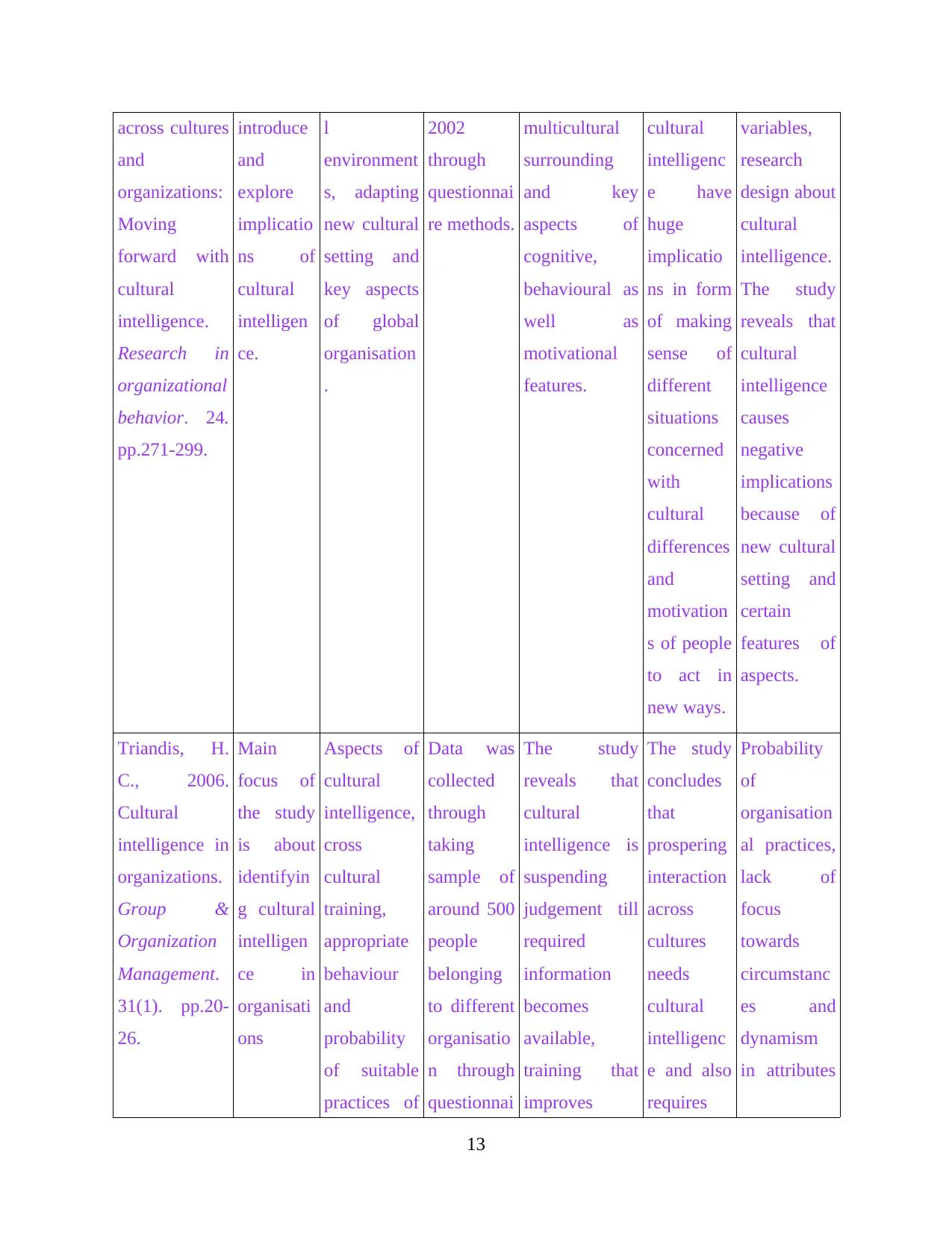
across cultures
and
organizations:
Moving
forward with
cultural
intelligence.
Research in
organizational
behavior. 24.
pp.271-299.
introduce
and
explore
implicatio
ns of
cultural
intelligen
ce.
l
environment
s, adapting
new cultural
setting and
key aspects
of global
organisation
.
2002
through
questionnai
re methods.
multicultural
surrounding
and key
aspects of
cognitive,
behavioural as
well as
motivational
features.
cultural
intelligenc
e have
huge
implicatio
ns in form
of making
sense of
different
situations
concerned
with
cultural
differences
and
motivation
s of people
to act in
new ways.
variables,
research
design about
cultural
intelligence.
The study
reveals that
cultural
intelligence
causes
negative
implications
because of
new cultural
setting and
certain
features of
aspects.
Triandis, H.
C., 2006.
Cultural
intelligence in
organizations.
Group &
Organization
Management.
31(1). pp.20-
26.
Main
focus of
the study
is about
identifyin
g cultural
intelligen
ce in
organisati
ons
Aspects of
cultural
intelligence,
cross
cultural
training,
appropriate
behaviour
and
probability
of suitable
practices of
Data was
collected
through
taking
sample of
around 500
people
belonging
to different
organisatio
n through
questionnai
The study
reveals that
cultural
intelligence is
suspending
judgement till
required
information
becomes
available,
training that
improves
The study
concludes
that
prospering
interaction
across
cultures
needs
cultural
intelligenc
e and also
requires
Probability
of
organisation
al practices,
lack of
focus
towards
circumstanc
es and
dynamism
in attributes
13
and
organizations:
Moving
forward with
cultural
intelligence.
Research in
organizational
behavior. 24.
pp.271-299.
introduce
and
explore
implicatio
ns of
cultural
intelligen
ce.
l
environment
s, adapting
new cultural
setting and
key aspects
of global
organisation
.
2002
through
questionnai
re methods.
multicultural
surrounding
and key
aspects of
cognitive,
behavioural as
well as
motivational
features.
cultural
intelligenc
e have
huge
implicatio
ns in form
of making
sense of
different
situations
concerned
with
cultural
differences
and
motivation
s of people
to act in
new ways.
variables,
research
design about
cultural
intelligence.
The study
reveals that
cultural
intelligence
causes
negative
implications
because of
new cultural
setting and
certain
features of
aspects.
Triandis, H.
C., 2006.
Cultural
intelligence in
organizations.
Group &
Organization
Management.
31(1). pp.20-
26.
Main
focus of
the study
is about
identifyin
g cultural
intelligen
ce in
organisati
ons
Aspects of
cultural
intelligence,
cross
cultural
training,
appropriate
behaviour
and
probability
of suitable
practices of
Data was
collected
through
taking
sample of
around 500
people
belonging
to different
organisatio
n through
questionnai
The study
reveals that
cultural
intelligence is
suspending
judgement till
required
information
becomes
available,
training that
improves
The study
concludes
that
prospering
interaction
across
cultures
needs
cultural
intelligenc
e and also
requires
Probability
of
organisation
al practices,
lack of
focus
towards
circumstanc
es and
dynamism
in attributes
13
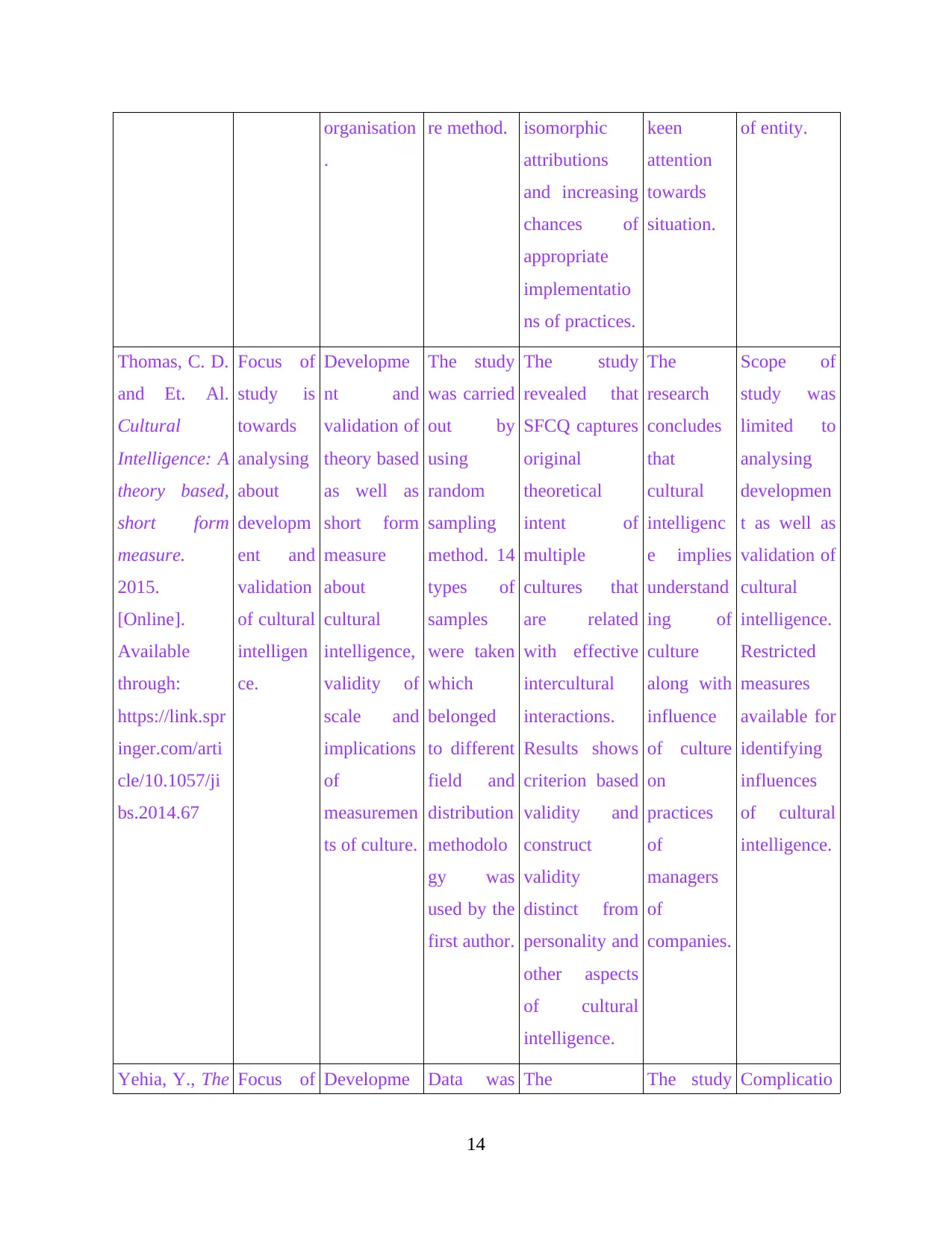
organisation
.
re method. isomorphic
attributions
and increasing
chances of
appropriate
implementatio
ns of practices.
keen
attention
towards
situation.
of entity.
Thomas, C. D.
and Et. Al.
Cultural
Intelligence: A
theory based,
short form
measure.
2015.
[Online].
Available
through:
https://link.spr
inger.com/arti
cle/10.1057/ji
bs.2014.67
Focus of
study is
towards
analysing
about
developm
ent and
validation
of cultural
intelligen
ce.
Developme
nt and
validation of
theory based
as well as
short form
measure
about
cultural
intelligence,
validity of
scale and
implications
of
measuremen
ts of culture.
The study
was carried
out by
using
random
sampling
method. 14
types of
samples
were taken
which
belonged
to different
field and
distribution
methodolo
gy was
used by the
first author.
The study
revealed that
SFCQ captures
original
theoretical
intent of
multiple
cultures that
are related
with effective
intercultural
interactions.
Results shows
criterion based
validity and
construct
validity
distinct from
personality and
other aspects
of cultural
intelligence.
The
research
concludes
that
cultural
intelligenc
e implies
understand
ing of
culture
along with
influence
of culture
on
practices
of
managers
of
companies.
Scope of
study was
limited to
analysing
developmen
t as well as
validation of
cultural
intelligence.
Restricted
measures
available for
identifying
influences
of cultural
intelligence.
Yehia, Y., The Focus of Developme Data was The The study Complicatio
14
.
re method. isomorphic
attributions
and increasing
chances of
appropriate
implementatio
ns of practices.
keen
attention
towards
situation.
of entity.
Thomas, C. D.
and Et. Al.
Cultural
Intelligence: A
theory based,
short form
measure.
2015.
[Online].
Available
through:
https://link.spr
inger.com/arti
cle/10.1057/ji
bs.2014.67
Focus of
study is
towards
analysing
about
developm
ent and
validation
of cultural
intelligen
ce.
Developme
nt and
validation of
theory based
as well as
short form
measure
about
cultural
intelligence,
validity of
scale and
implications
of
measuremen
ts of culture.
The study
was carried
out by
using
random
sampling
method. 14
types of
samples
were taken
which
belonged
to different
field and
distribution
methodolo
gy was
used by the
first author.
The study
revealed that
SFCQ captures
original
theoretical
intent of
multiple
cultures that
are related
with effective
intercultural
interactions.
Results shows
criterion based
validity and
construct
validity
distinct from
personality and
other aspects
of cultural
intelligence.
The
research
concludes
that
cultural
intelligenc
e implies
understand
ing of
culture
along with
influence
of culture
on
practices
of
managers
of
companies.
Scope of
study was
limited to
analysing
developmen
t as well as
validation of
cultural
intelligence.
Restricted
measures
available for
identifying
influences
of cultural
intelligence.
Yehia, Y., The Focus of Developme Data was The The study Complicatio
14
Secure Best Marks with AI Grader
Need help grading? Try our AI Grader for instant feedback on your assignments.
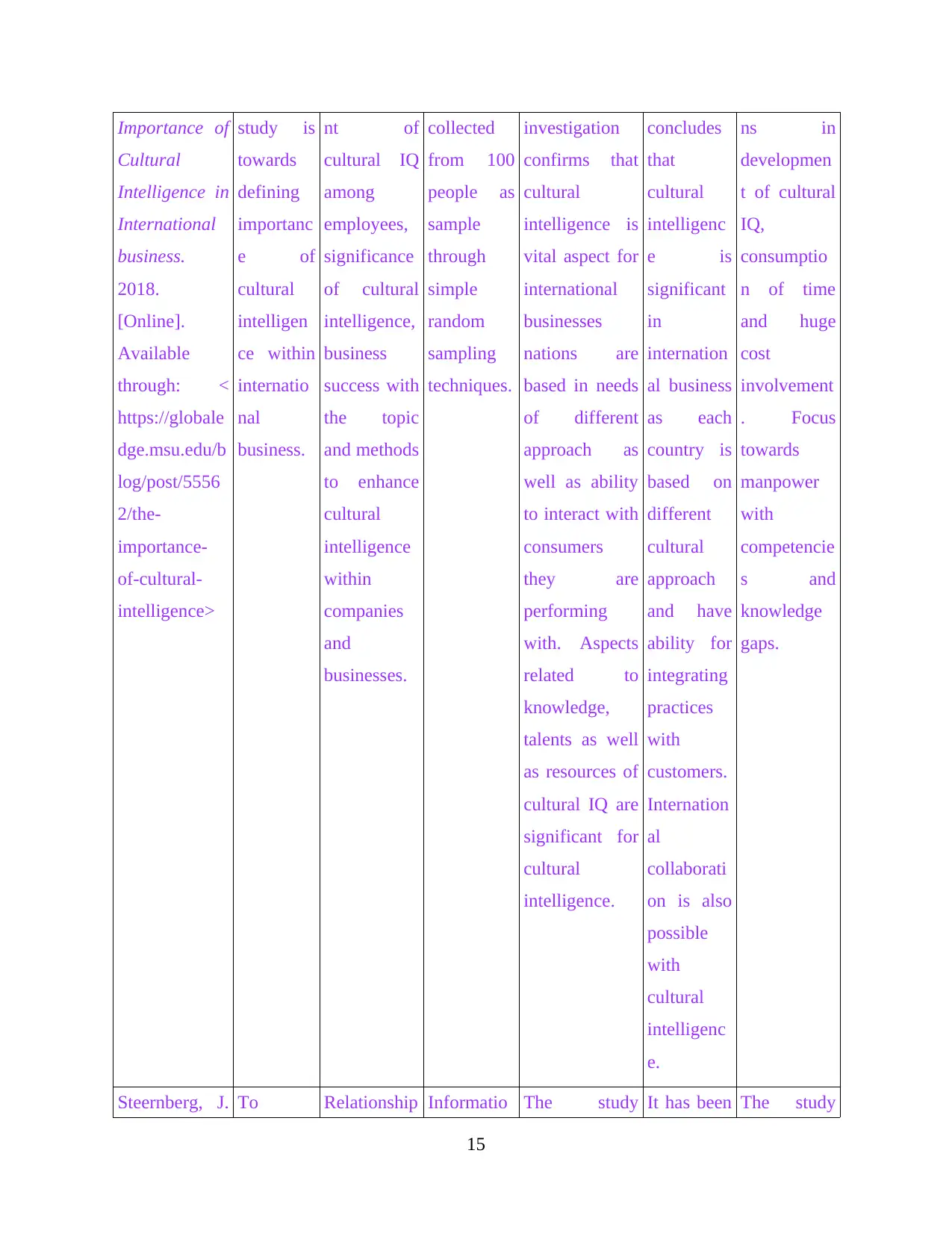
Importance of
Cultural
Intelligence in
International
business.
2018.
[Online].
Available
through: <
https://globale
dge.msu.edu/b
log/post/5556
2/the-
importance-
of-cultural-
intelligence>
study is
towards
defining
importanc
e of
cultural
intelligen
ce within
internatio
nal
business.
nt of
cultural IQ
among
employees,
significance
of cultural
intelligence,
business
success with
the topic
and methods
to enhance
cultural
intelligence
within
companies
and
businesses.
collected
from 100
people as
sample
through
simple
random
sampling
techniques.
investigation
confirms that
cultural
intelligence is
vital aspect for
international
businesses
nations are
based in needs
of different
approach as
well as ability
to interact with
consumers
they are
performing
with. Aspects
related to
knowledge,
talents as well
as resources of
cultural IQ are
significant for
cultural
intelligence.
concludes
that
cultural
intelligenc
e is
significant
in
internation
al business
as each
country is
based on
different
cultural
approach
and have
ability for
integrating
practices
with
customers.
Internation
al
collaborati
on is also
possible
with
cultural
intelligenc
e.
ns in
developmen
t of cultural
IQ,
consumptio
n of time
and huge
cost
involvement
. Focus
towards
manpower
with
competencie
s and
knowledge
gaps.
Steernberg, J. To Relationship Informatio The study It has been The study
15
Cultural
Intelligence in
International
business.
2018.
[Online].
Available
through: <
https://globale
dge.msu.edu/b
log/post/5556
2/the-
importance-
of-cultural-
intelligence>
study is
towards
defining
importanc
e of
cultural
intelligen
ce within
internatio
nal
business.
nt of
cultural IQ
among
employees,
significance
of cultural
intelligence,
business
success with
the topic
and methods
to enhance
cultural
intelligence
within
companies
and
businesses.
collected
from 100
people as
sample
through
simple
random
sampling
techniques.
investigation
confirms that
cultural
intelligence is
vital aspect for
international
businesses
nations are
based in needs
of different
approach as
well as ability
to interact with
consumers
they are
performing
with. Aspects
related to
knowledge,
talents as well
as resources of
cultural IQ are
significant for
cultural
intelligence.
concludes
that
cultural
intelligenc
e is
significant
in
internation
al business
as each
country is
based on
different
cultural
approach
and have
ability for
integrating
practices
with
customers.
Internation
al
collaborati
on is also
possible
with
cultural
intelligenc
e.
ns in
developmen
t of cultural
IQ,
consumptio
n of time
and huge
cost
involvement
. Focus
towards
manpower
with
competencie
s and
knowledge
gaps.
Steernberg, J. To Relationship Informatio The study It has been The study
15
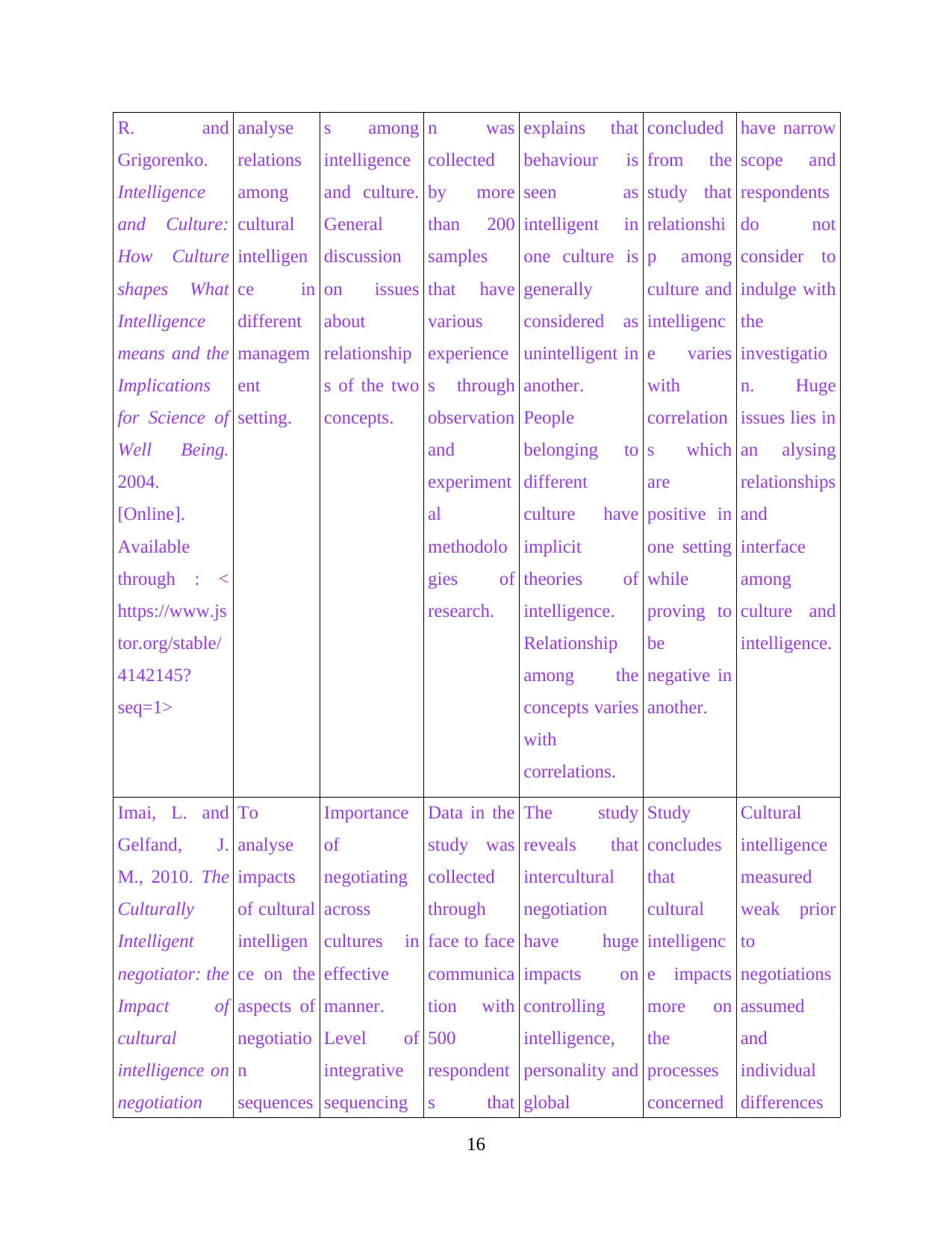
R. and
Grigorenko.
Intelligence
and Culture:
How Culture
shapes What
Intelligence
means and the
Implications
for Science of
Well Being.
2004.
[Online].
Available
through : <
https://www.js
tor.org/stable/
4142145?
seq=1>
analyse
relations
among
cultural
intelligen
ce in
different
managem
ent
setting.
s among
intelligence
and culture.
General
discussion
on issues
about
relationship
s of the two
concepts.
n was
collected
by more
than 200
samples
that have
various
experience
s through
observation
and
experiment
al
methodolo
gies of
research.
explains that
behaviour is
seen as
intelligent in
one culture is
generally
considered as
unintelligent in
another.
People
belonging to
different
culture have
implicit
theories of
intelligence.
Relationship
among the
concepts varies
with
correlations.
concluded
from the
study that
relationshi
p among
culture and
intelligenc
e varies
with
correlation
s which
are
positive in
one setting
while
proving to
be
negative in
another.
have narrow
scope and
respondents
do not
consider to
indulge with
the
investigatio
n. Huge
issues lies in
an alysing
relationships
and
interface
among
culture and
intelligence.
Imai, L. and
Gelfand, J.
M., 2010. The
Culturally
Intelligent
negotiator: the
Impact of
cultural
intelligence on
negotiation
To
analyse
impacts
of cultural
intelligen
ce on the
aspects of
negotiatio
n
sequences
Importance
of
negotiating
across
cultures in
effective
manner.
Level of
integrative
sequencing
Data in the
study was
collected
through
face to face
communica
tion with
500
respondent
s that
The study
reveals that
intercultural
negotiation
have huge
impacts on
controlling
intelligence,
personality and
global
Study
concludes
that
cultural
intelligenc
e impacts
more on
the
processes
concerned
Cultural
intelligence
measured
weak prior
to
negotiations
assumed
and
individual
differences
16
Grigorenko.
Intelligence
and Culture:
How Culture
shapes What
Intelligence
means and the
Implications
for Science of
Well Being.
2004.
[Online].
Available
through : <
https://www.js
tor.org/stable/
4142145?
seq=1>
analyse
relations
among
cultural
intelligen
ce in
different
managem
ent
setting.
s among
intelligence
and culture.
General
discussion
on issues
about
relationship
s of the two
concepts.
n was
collected
by more
than 200
samples
that have
various
experience
s through
observation
and
experiment
al
methodolo
gies of
research.
explains that
behaviour is
seen as
intelligent in
one culture is
generally
considered as
unintelligent in
another.
People
belonging to
different
culture have
implicit
theories of
intelligence.
Relationship
among the
concepts varies
with
correlations.
concluded
from the
study that
relationshi
p among
culture and
intelligenc
e varies
with
correlation
s which
are
positive in
one setting
while
proving to
be
negative in
another.
have narrow
scope and
respondents
do not
consider to
indulge with
the
investigatio
n. Huge
issues lies in
an alysing
relationships
and
interface
among
culture and
intelligence.
Imai, L. and
Gelfand, J.
M., 2010. The
Culturally
Intelligent
negotiator: the
Impact of
cultural
intelligence on
negotiation
To
analyse
impacts
of cultural
intelligen
ce on the
aspects of
negotiatio
n
sequences
Importance
of
negotiating
across
cultures in
effective
manner.
Level of
integrative
sequencing
Data in the
study was
collected
through
face to face
communica
tion with
500
respondent
s that
The study
reveals that
intercultural
negotiation
have huge
impacts on
controlling
intelligence,
personality and
global
Study
concludes
that
cultural
intelligenc
e impacts
more on
the
processes
concerned
Cultural
intelligence
measured
weak prior
to
negotiations
assumed
and
individual
differences
16
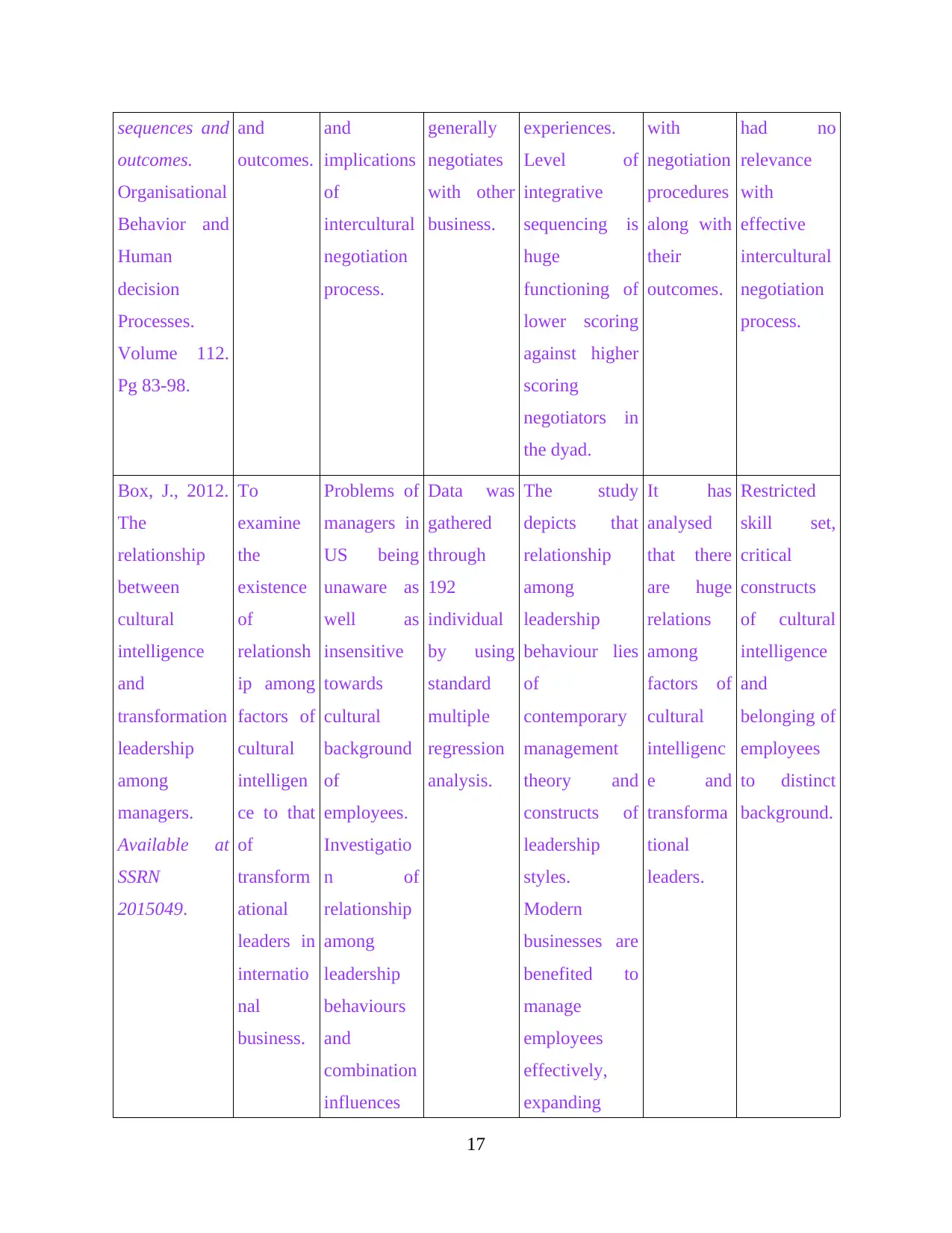
sequences and
outcomes.
Organisational
Behavior and
Human
decision
Processes.
Volume 112.
Pg 83-98.
and
outcomes.
and
implications
of
intercultural
negotiation
process.
generally
negotiates
with other
business.
experiences.
Level of
integrative
sequencing is
huge
functioning of
lower scoring
against higher
scoring
negotiators in
the dyad.
with
negotiation
procedures
along with
their
outcomes.
had no
relevance
with
effective
intercultural
negotiation
process.
Box, J., 2012.
The
relationship
between
cultural
intelligence
and
transformation
leadership
among
managers.
Available at
SSRN
2015049.
To
examine
the
existence
of
relationsh
ip among
factors of
cultural
intelligen
ce to that
of
transform
ational
leaders in
internatio
nal
business.
Problems of
managers in
US being
unaware as
well as
insensitive
towards
cultural
background
of
employees.
Investigatio
n of
relationship
among
leadership
behaviours
and
combination
influences
Data was
gathered
through
192
individual
by using
standard
multiple
regression
analysis.
The study
depicts that
relationship
among
leadership
behaviour lies
of
contemporary
management
theory and
constructs of
leadership
styles.
Modern
businesses are
benefited to
manage
employees
effectively,
expanding
It has
analysed
that there
are huge
relations
among
factors of
cultural
intelligenc
e and
transforma
tional
leaders.
Restricted
skill set,
critical
constructs
of cultural
intelligence
and
belonging of
employees
to distinct
background.
17
outcomes.
Organisational
Behavior and
Human
decision
Processes.
Volume 112.
Pg 83-98.
and
outcomes.
and
implications
of
intercultural
negotiation
process.
generally
negotiates
with other
business.
experiences.
Level of
integrative
sequencing is
huge
functioning of
lower scoring
against higher
scoring
negotiators in
the dyad.
with
negotiation
procedures
along with
their
outcomes.
had no
relevance
with
effective
intercultural
negotiation
process.
Box, J., 2012.
The
relationship
between
cultural
intelligence
and
transformation
leadership
among
managers.
Available at
SSRN
2015049.
To
examine
the
existence
of
relationsh
ip among
factors of
cultural
intelligen
ce to that
of
transform
ational
leaders in
internatio
nal
business.
Problems of
managers in
US being
unaware as
well as
insensitive
towards
cultural
background
of
employees.
Investigatio
n of
relationship
among
leadership
behaviours
and
combination
influences
Data was
gathered
through
192
individual
by using
standard
multiple
regression
analysis.
The study
depicts that
relationship
among
leadership
behaviour lies
of
contemporary
management
theory and
constructs of
leadership
styles.
Modern
businesses are
benefited to
manage
employees
effectively,
expanding
It has
analysed
that there
are huge
relations
among
factors of
cultural
intelligenc
e and
transforma
tional
leaders.
Restricted
skill set,
critical
constructs
of cultural
intelligence
and
belonging of
employees
to distinct
background.
17
Paraphrase This Document
Need a fresh take? Get an instant paraphrase of this document with our AI Paraphraser
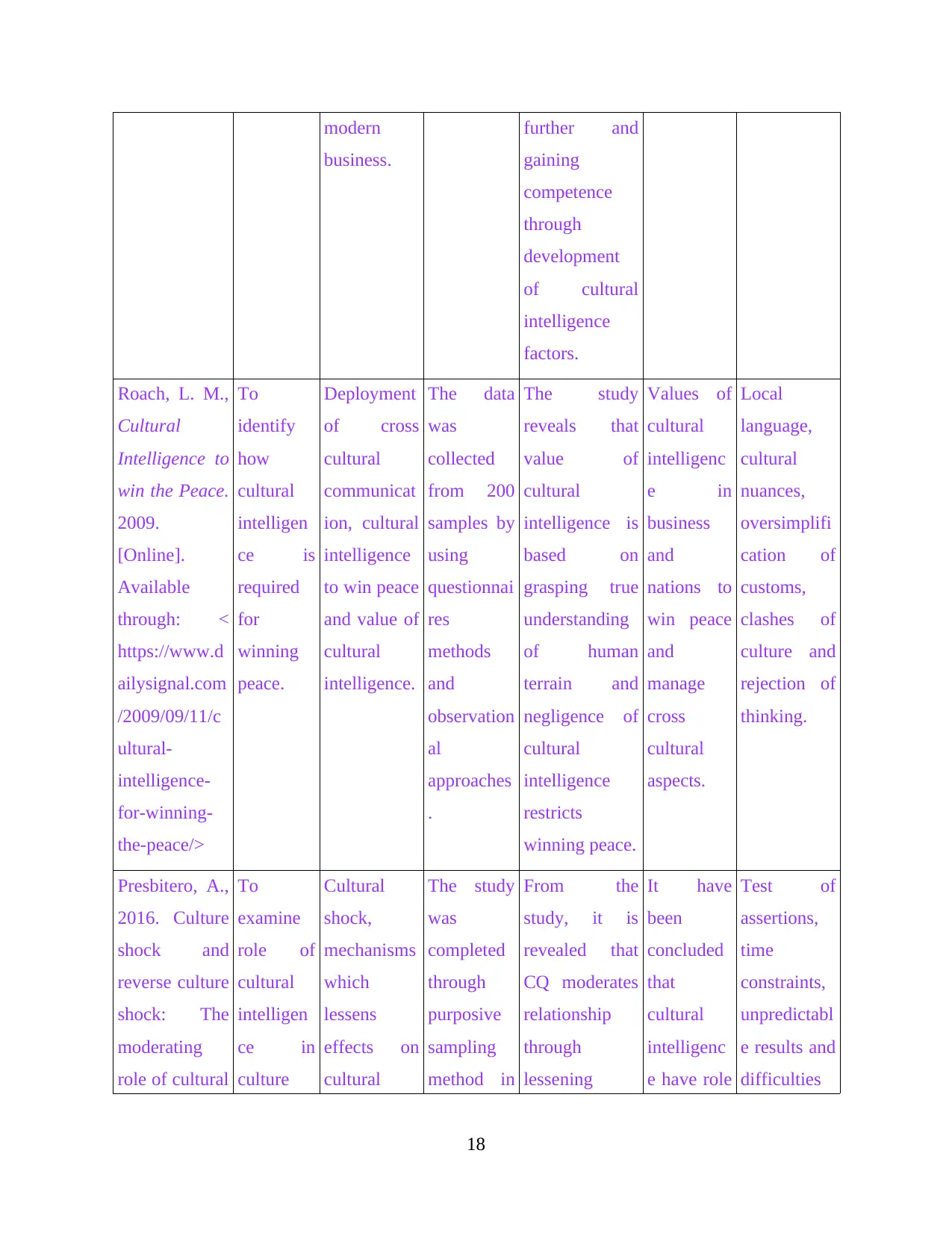
modern
business.
further and
gaining
competence
through
development
of cultural
intelligence
factors.
Roach, L. M.,
Cultural
Intelligence to
win the Peace.
2009.
[Online].
Available
through: <
https://www.d
ailysignal.com
/2009/09/11/c
ultural-
intelligence-
for-winning-
the-peace/>
To
identify
how
cultural
intelligen
ce is
required
for
winning
peace.
Deployment
of cross
cultural
communicat
ion, cultural
intelligence
to win peace
and value of
cultural
intelligence.
The data
was
collected
from 200
samples by
using
questionnai
res
methods
and
observation
al
approaches
.
The study
reveals that
value of
cultural
intelligence is
based on
grasping true
understanding
of human
terrain and
negligence of
cultural
intelligence
restricts
winning peace.
Values of
cultural
intelligenc
e in
business
and
nations to
win peace
and
manage
cross
cultural
aspects.
Local
language,
cultural
nuances,
oversimplifi
cation of
customs,
clashes of
culture and
rejection of
thinking.
Presbitero, A.,
2016. Culture
shock and
reverse culture
shock: The
moderating
role of cultural
To
examine
role of
cultural
intelligen
ce in
culture
Cultural
shock,
mechanisms
which
lessens
effects on
cultural
The study
was
completed
through
purposive
sampling
method in
From the
study, it is
revealed that
CQ moderates
relationship
through
lessening
It have
been
concluded
that
cultural
intelligenc
e have role
Test of
assertions,
time
constraints,
unpredictabl
e results and
difficulties
18
business.
further and
gaining
competence
through
development
of cultural
intelligence
factors.
Roach, L. M.,
Cultural
Intelligence to
win the Peace.
2009.
[Online].
Available
through: <
https://www.d
ailysignal.com
/2009/09/11/c
ultural-
intelligence-
for-winning-
the-peace/>
To
identify
how
cultural
intelligen
ce is
required
for
winning
peace.
Deployment
of cross
cultural
communicat
ion, cultural
intelligence
to win peace
and value of
cultural
intelligence.
The data
was
collected
from 200
samples by
using
questionnai
res
methods
and
observation
al
approaches
.
The study
reveals that
value of
cultural
intelligence is
based on
grasping true
understanding
of human
terrain and
negligence of
cultural
intelligence
restricts
winning peace.
Values of
cultural
intelligenc
e in
business
and
nations to
win peace
and
manage
cross
cultural
aspects.
Local
language,
cultural
nuances,
oversimplifi
cation of
customs,
clashes of
culture and
rejection of
thinking.
Presbitero, A.,
2016. Culture
shock and
reverse culture
shock: The
moderating
role of cultural
To
examine
role of
cultural
intelligen
ce in
culture
Cultural
shock,
mechanisms
which
lessens
effects on
cultural
The study
was
completed
through
purposive
sampling
method in
From the
study, it is
revealed that
CQ moderates
relationship
through
lessening
It have
been
concluded
that
cultural
intelligenc
e have role
Test of
assertions,
time
constraints,
unpredictabl
e results and
difficulties
18
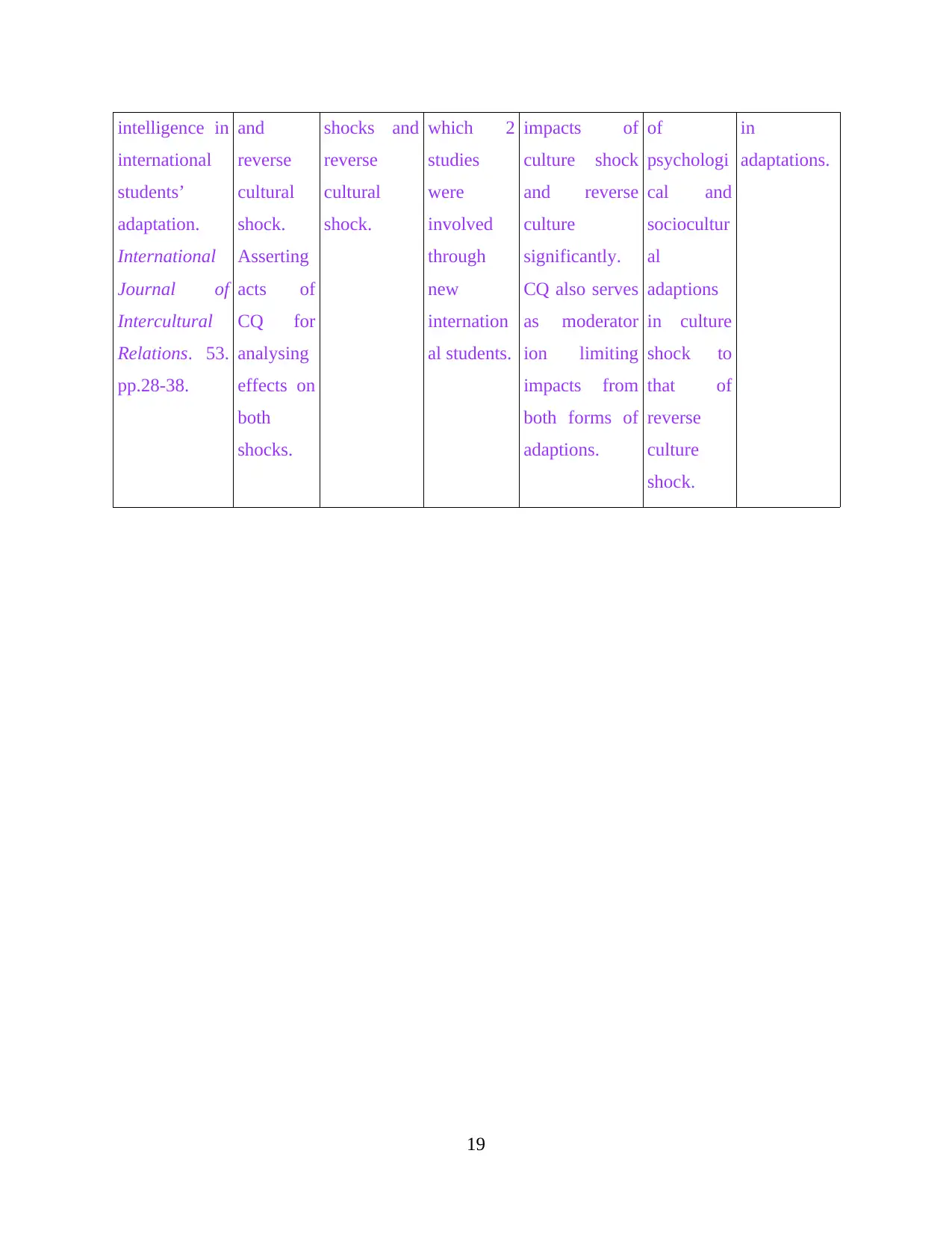
intelligence in
international
students’
adaptation.
International
Journal of
Intercultural
Relations. 53.
pp.28-38.
and
reverse
cultural
shock.
Asserting
acts of
CQ for
analysing
effects on
both
shocks.
shocks and
reverse
cultural
shock.
which 2
studies
were
involved
through
new
internation
al students.
impacts of
culture shock
and reverse
culture
significantly.
CQ also serves
as moderator
ion limiting
impacts from
both forms of
adaptions.
of
psychologi
cal and
sociocultur
al
adaptions
in culture
shock to
that of
reverse
culture
shock.
in
adaptations.
19
international
students’
adaptation.
International
Journal of
Intercultural
Relations. 53.
pp.28-38.
and
reverse
cultural
shock.
Asserting
acts of
CQ for
analysing
effects on
both
shocks.
shocks and
reverse
cultural
shock.
which 2
studies
were
involved
through
new
internation
al students.
impacts of
culture shock
and reverse
culture
significantly.
CQ also serves
as moderator
ion limiting
impacts from
both forms of
adaptions.
of
psychologi
cal and
sociocultur
al
adaptions
in culture
shock to
that of
reverse
culture
shock.
in
adaptations.
19
1 out of 21
Related Documents
Your All-in-One AI-Powered Toolkit for Academic Success.
+13062052269
info@desklib.com
Available 24*7 on WhatsApp / Email
![[object Object]](/_next/static/media/star-bottom.7253800d.svg)
Unlock your academic potential
© 2024 | Zucol Services PVT LTD | All rights reserved.





